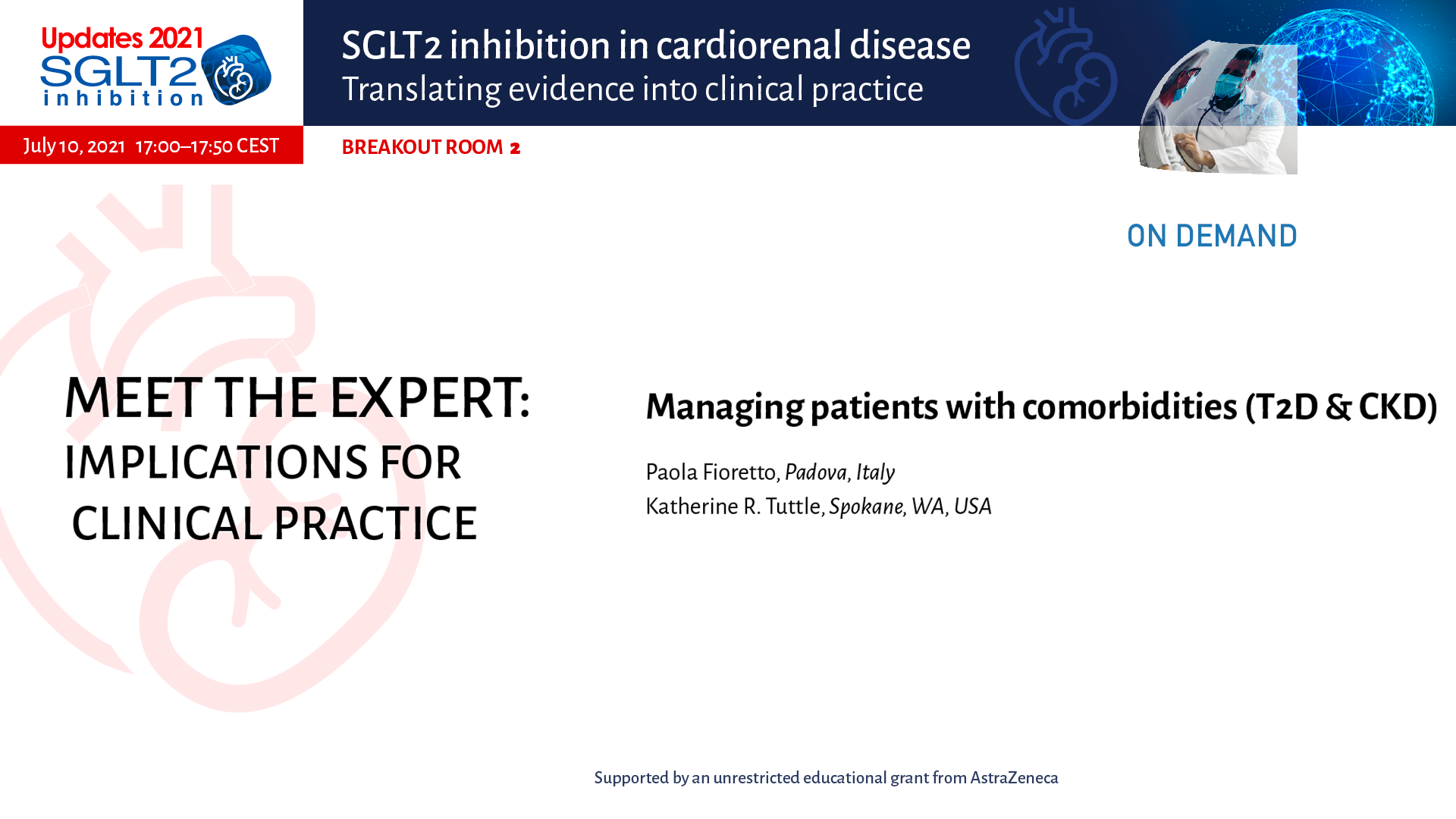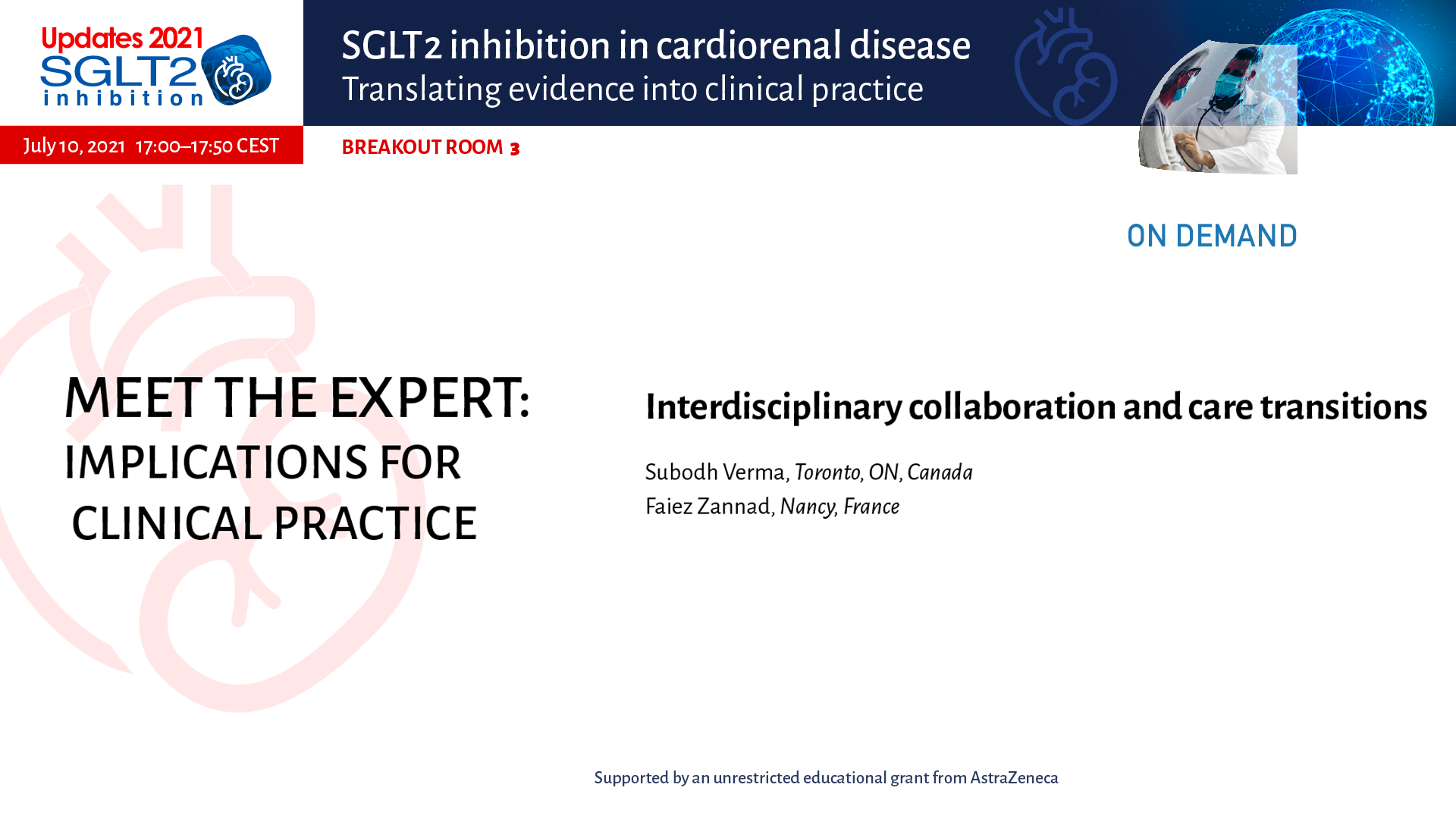SGLT2 Inhibition Updates 2021 - SGLT2 Inhibition in Cardiorenal Disease
Published: 20 July 2021
-
Views:
 25033
25033
-
Likes:
 7
7
-
Views:
 25033
25033
-
Likes:
 7
7
-
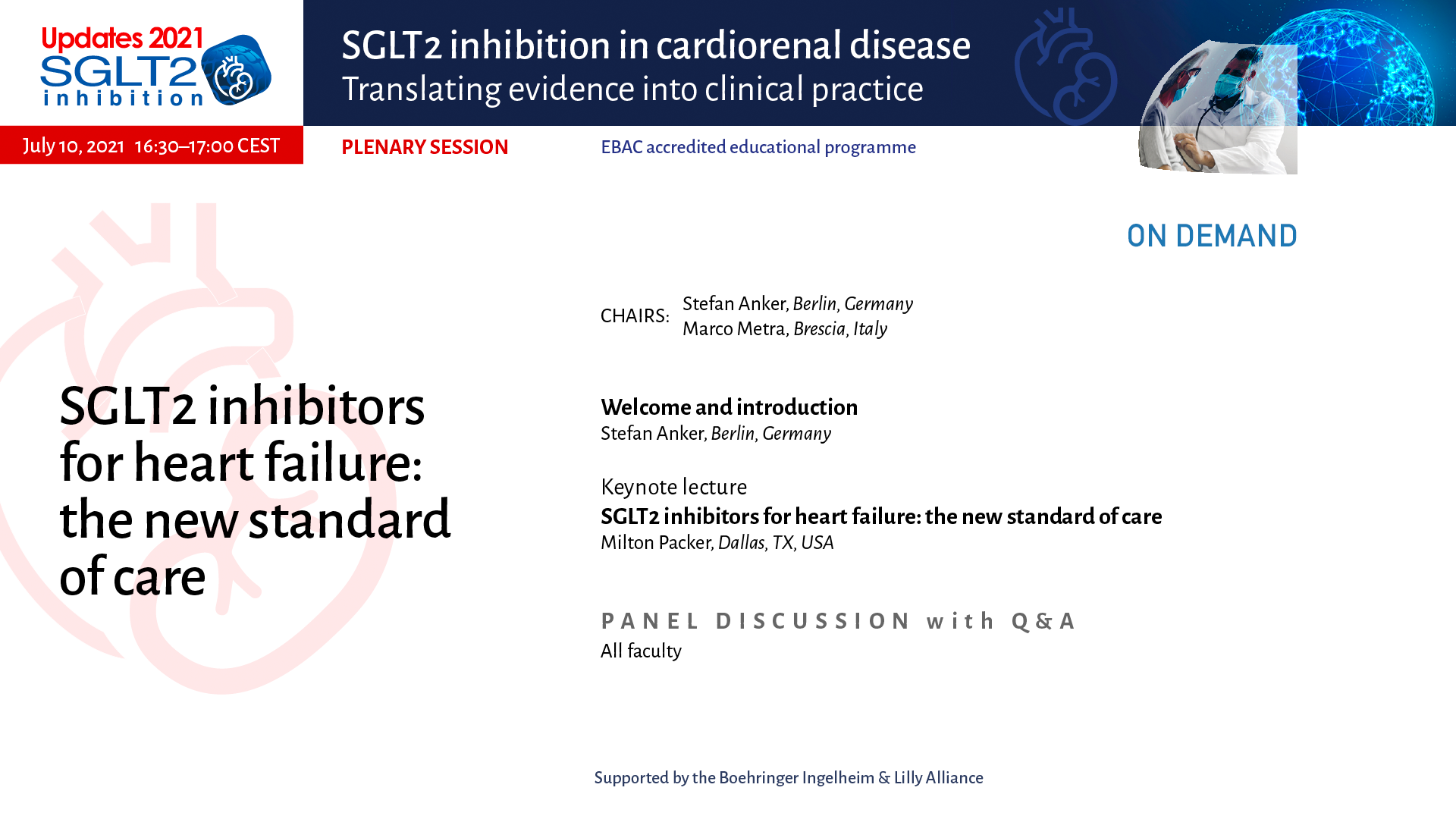 Up Next
Up Next -
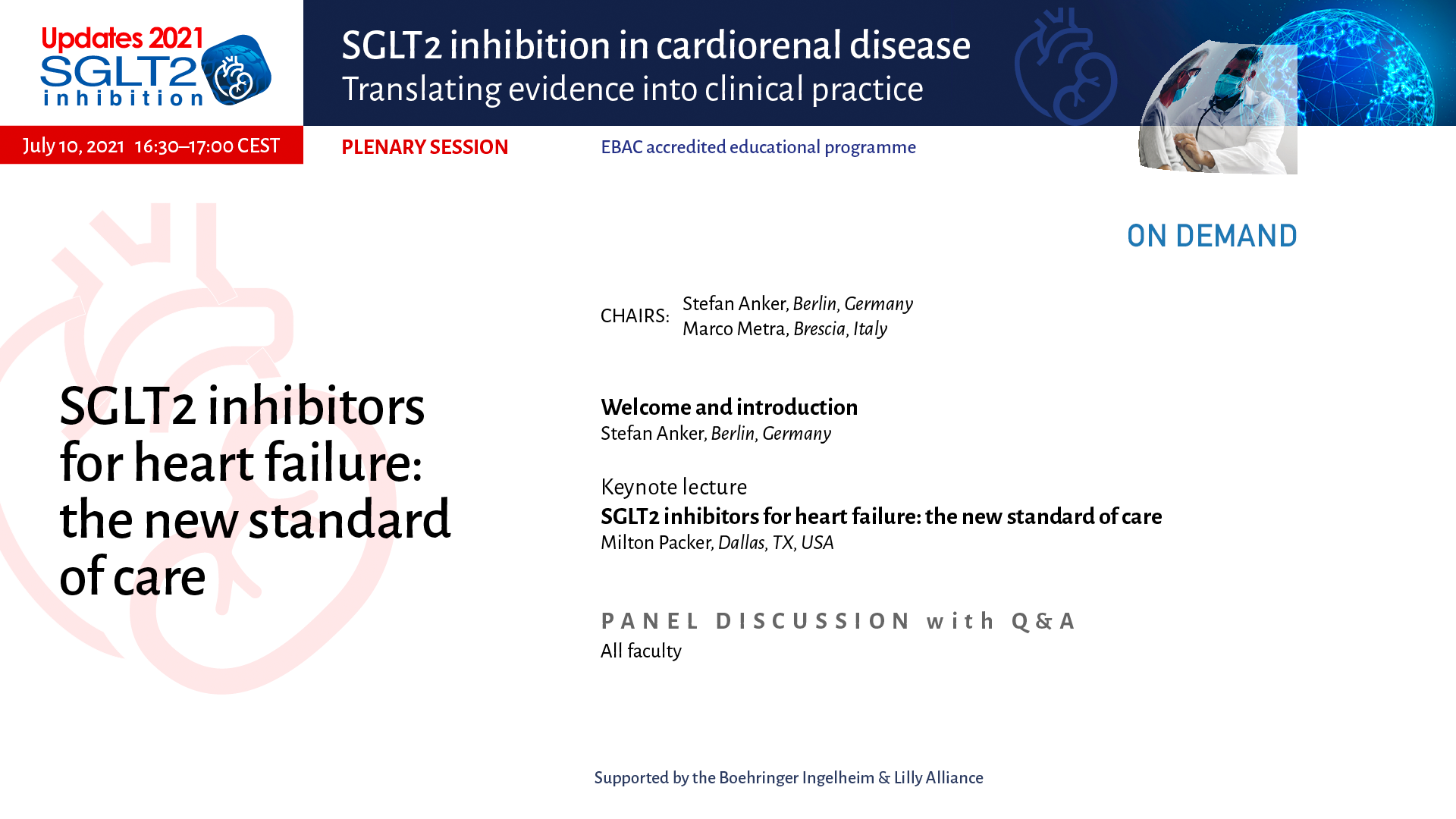 11m 29sPart 7 | Session 3 Panel Discussion
11m 29sPart 7 | Session 3 Panel Discussion
-
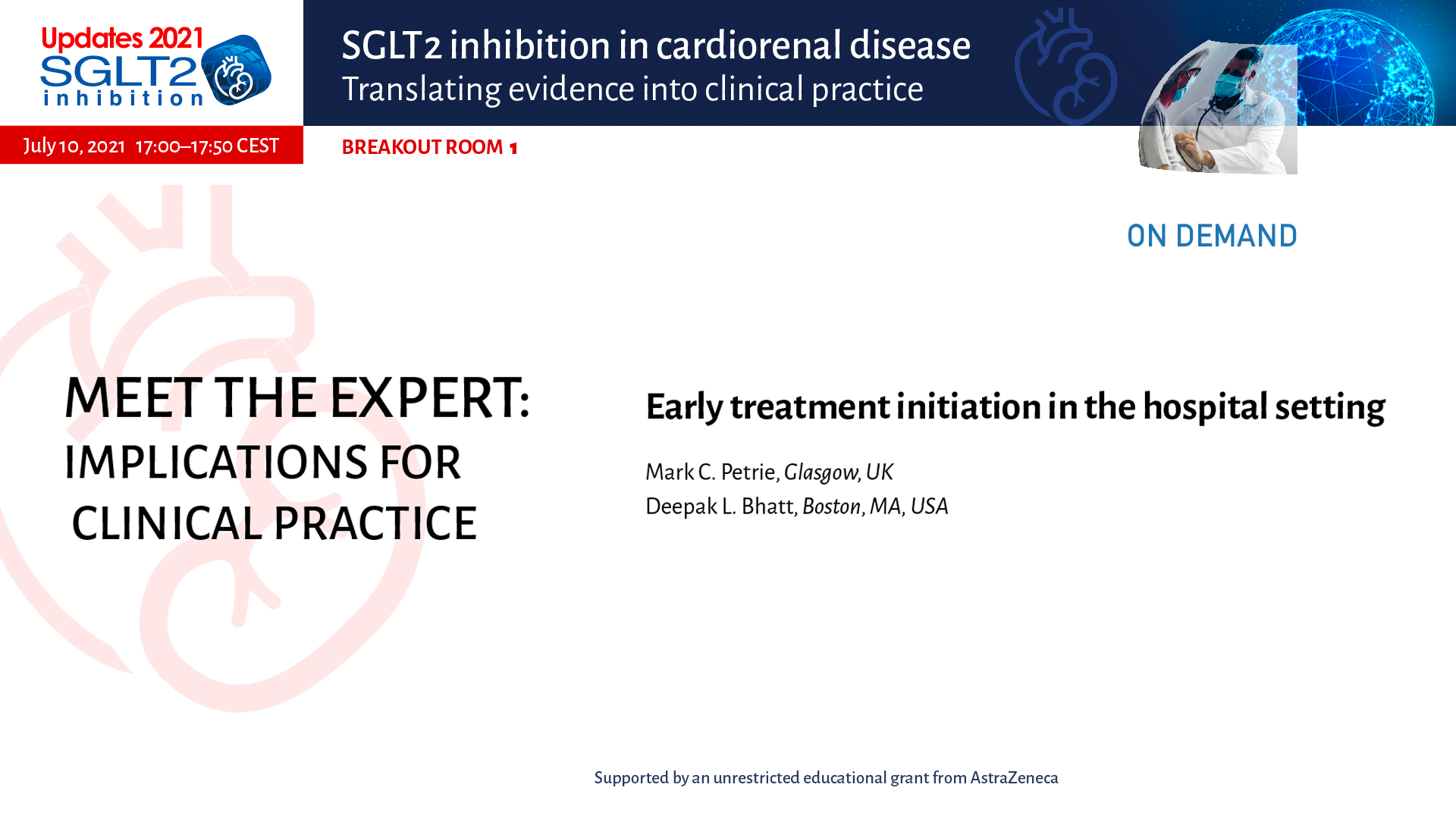 11m 8sPart 8 | Session 1 Welcome and Introduction
11m 8sPart 8 | Session 1 Welcome and Introduction -
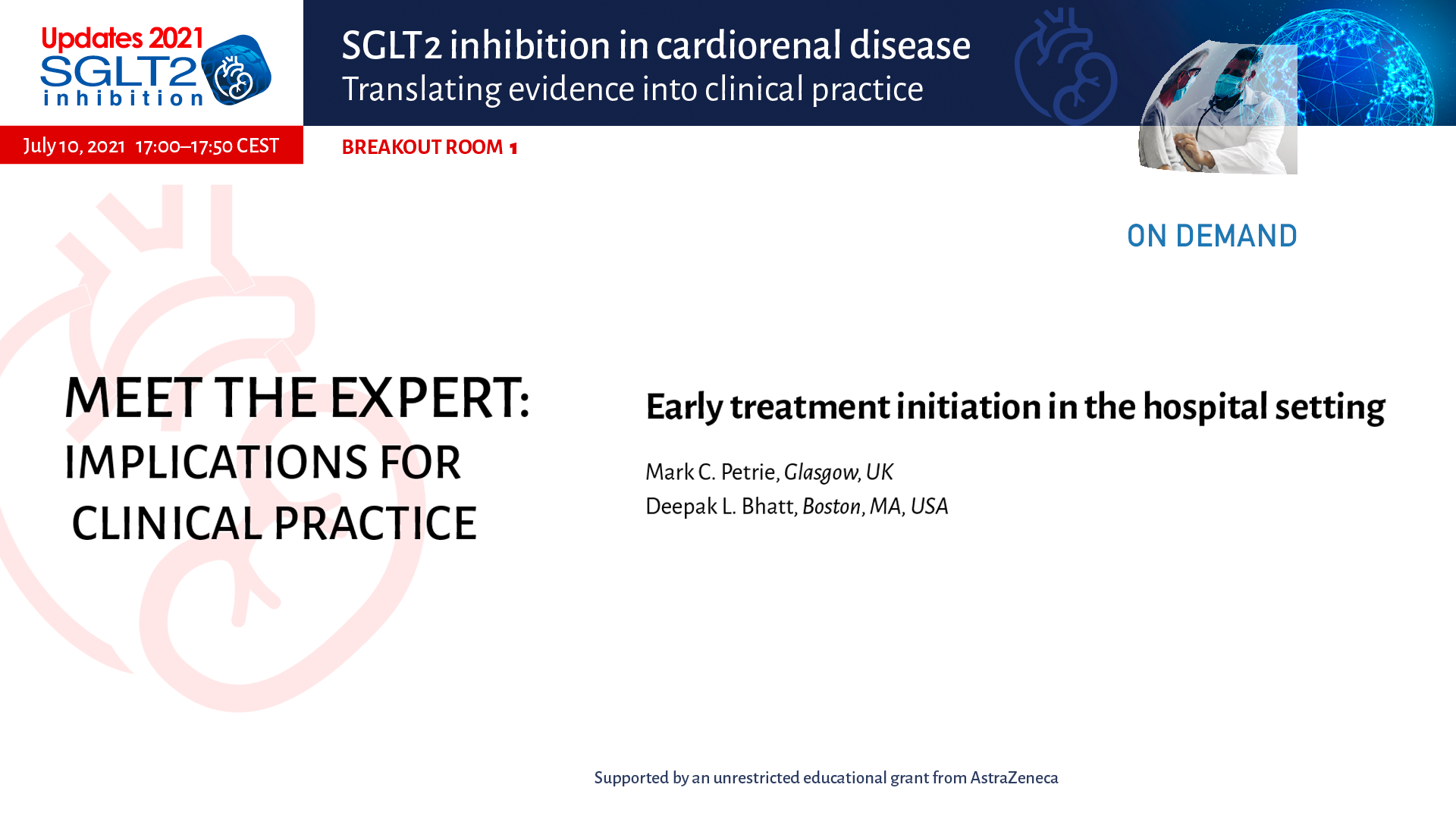 6m 43sPart 8 | Session 2 Soloist Trial Overview
6m 43sPart 8 | Session 2 Soloist Trial Overview -
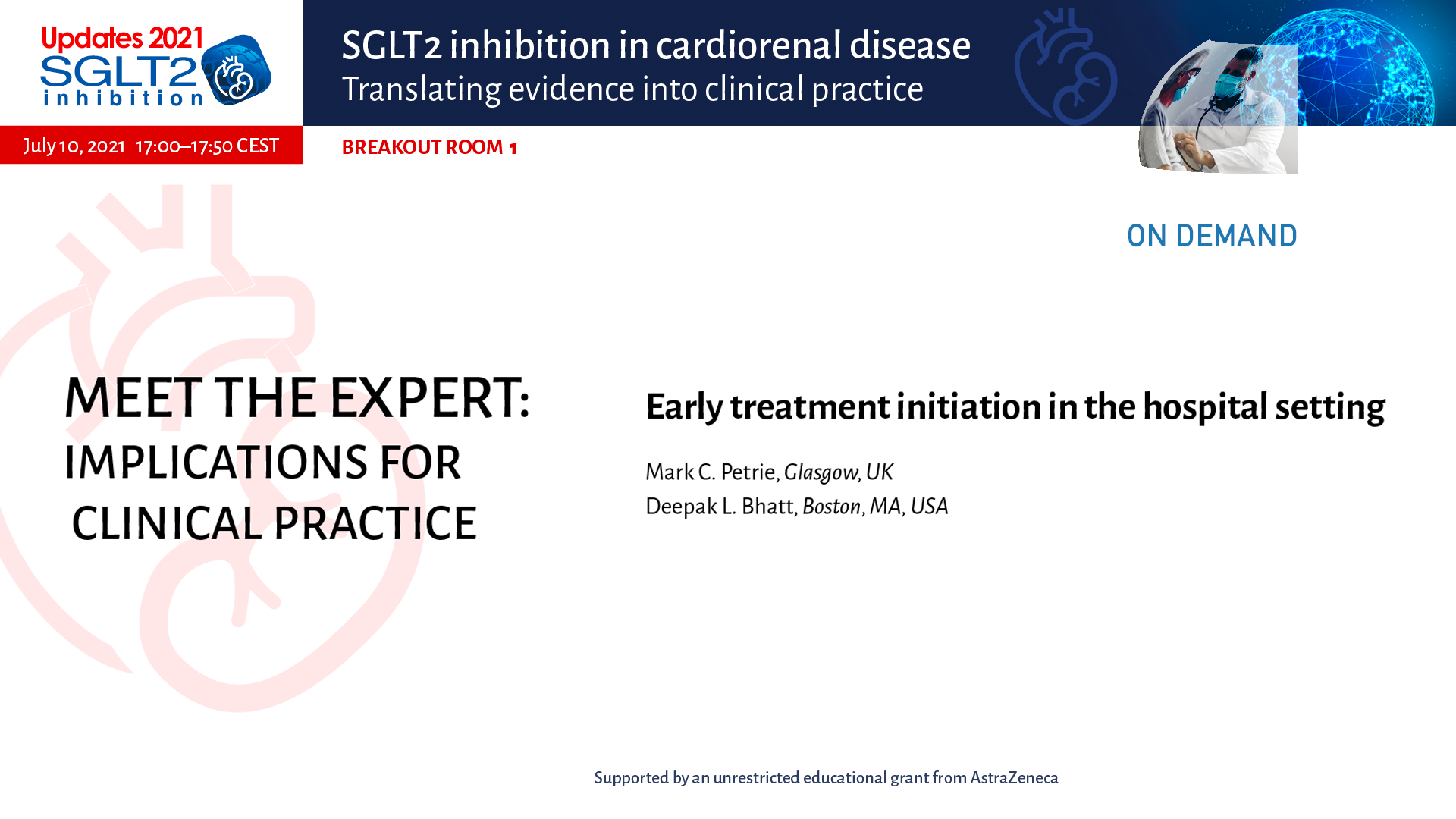 36m 32sPart 8 | Session 3 Discussion
36m 32sPart 8 | Session 3 Discussion
-
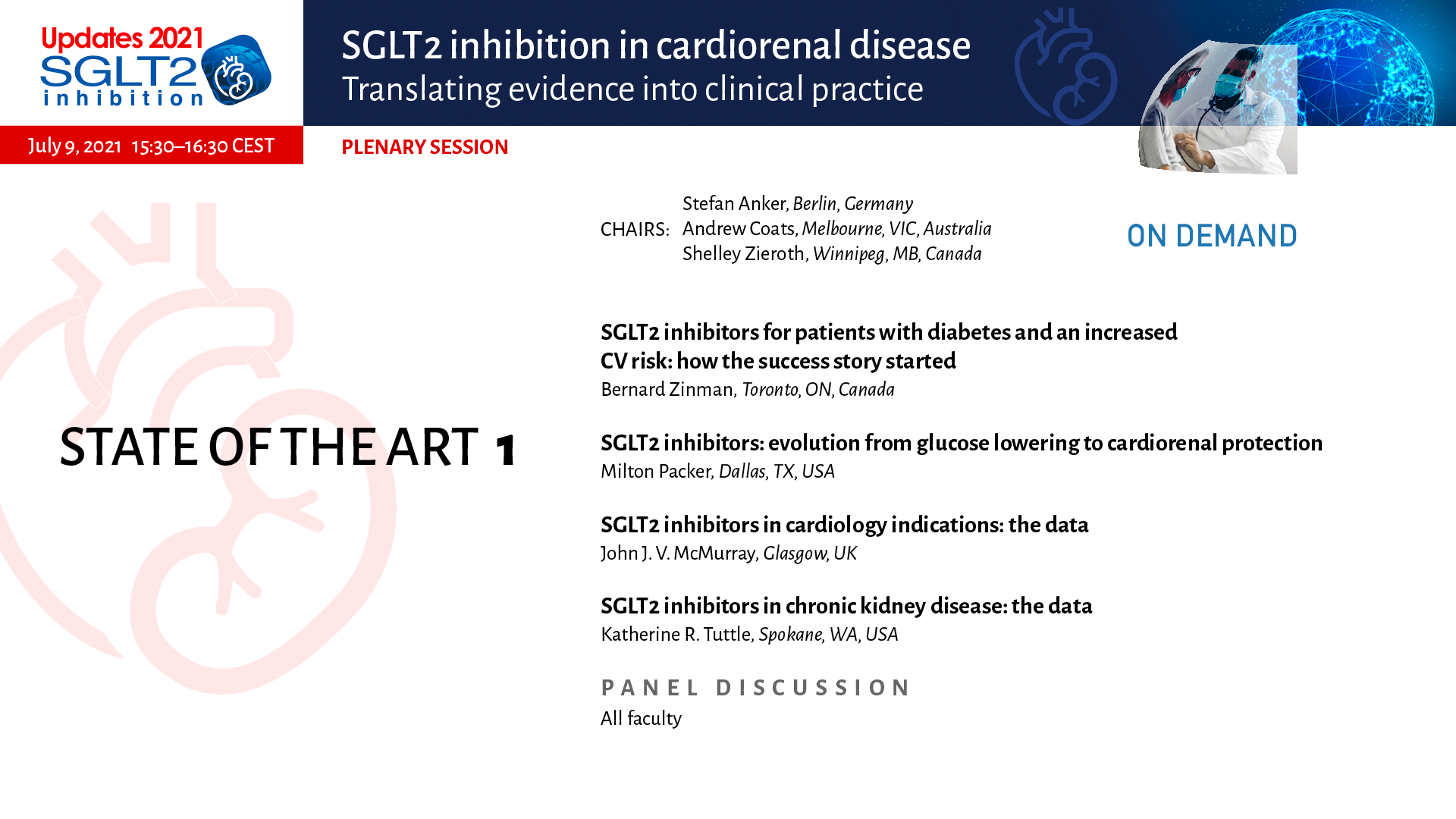 53sPart 1 | Session 1 Welcome and Introduction Stefan Anker, Shelley Zieroth
53sPart 1 | Session 1 Welcome and Introduction Stefan Anker, Shelley Zieroth
-
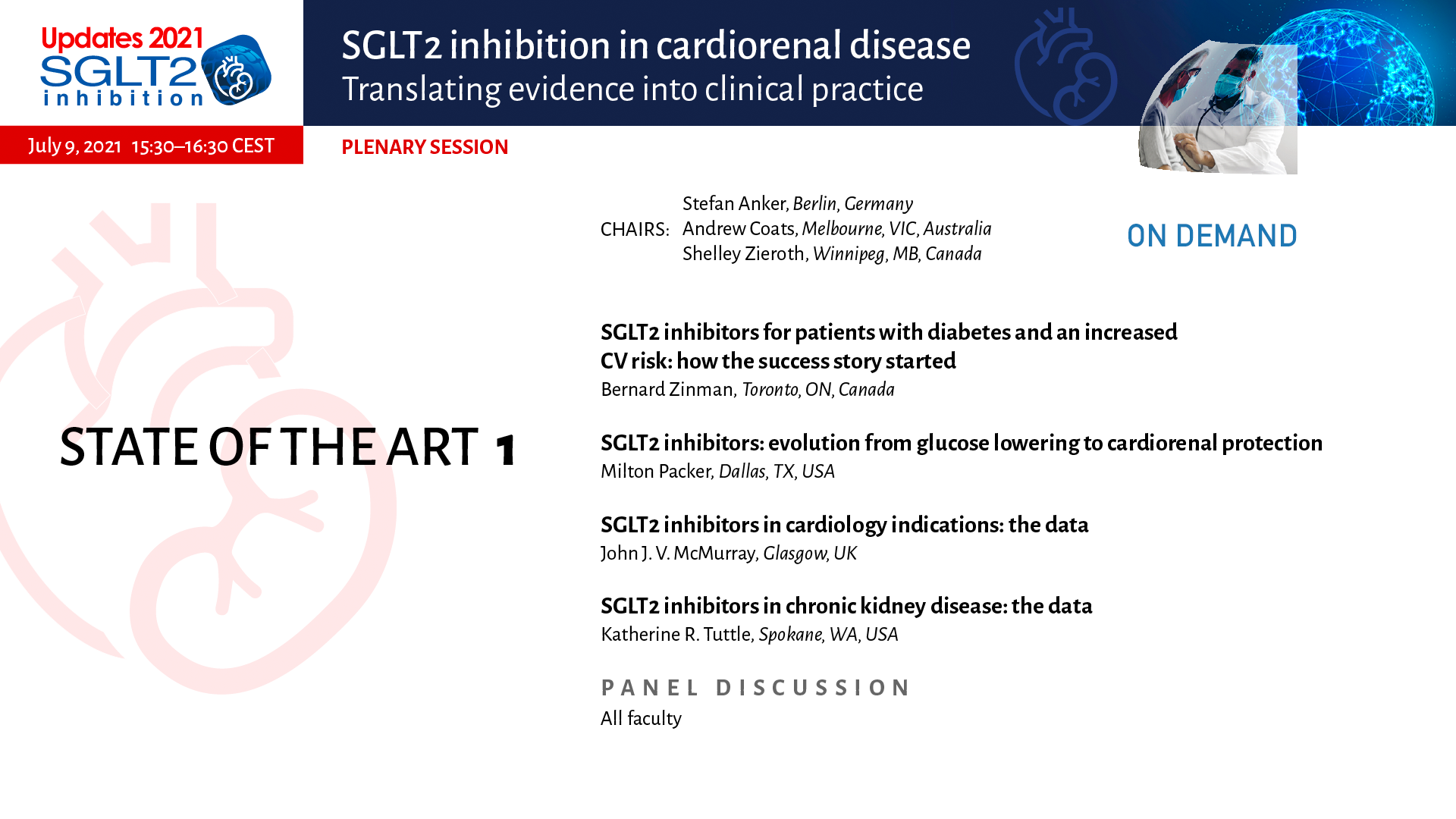 10m 23sPart 1 | Session 2 SGLT2 Inhibitors for Patients with Diabetes and an Increased CV Risk: How The Success Story Started Bernard Zinman
10m 23sPart 1 | Session 2 SGLT2 Inhibitors for Patients with Diabetes and an Increased CV Risk: How The Success Story Started Bernard Zinman
-
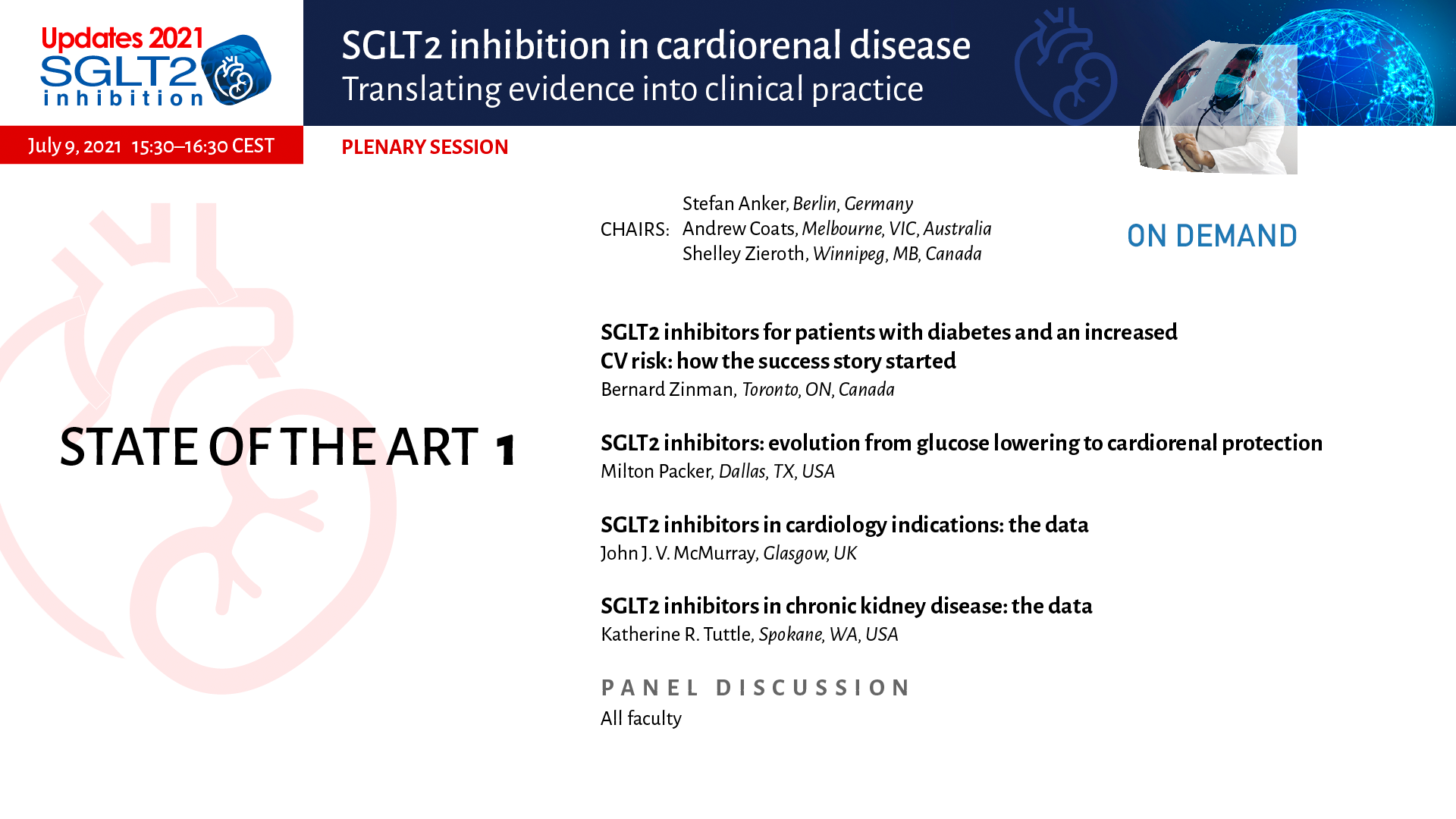 9m 18sPart 1 | Session 3 SGLT2 Inhibitors: Evolution from Glucose Lowering to Cardiorenal Protection Milton Packer
9m 18sPart 1 | Session 3 SGLT2 Inhibitors: Evolution from Glucose Lowering to Cardiorenal Protection Milton Packer
-
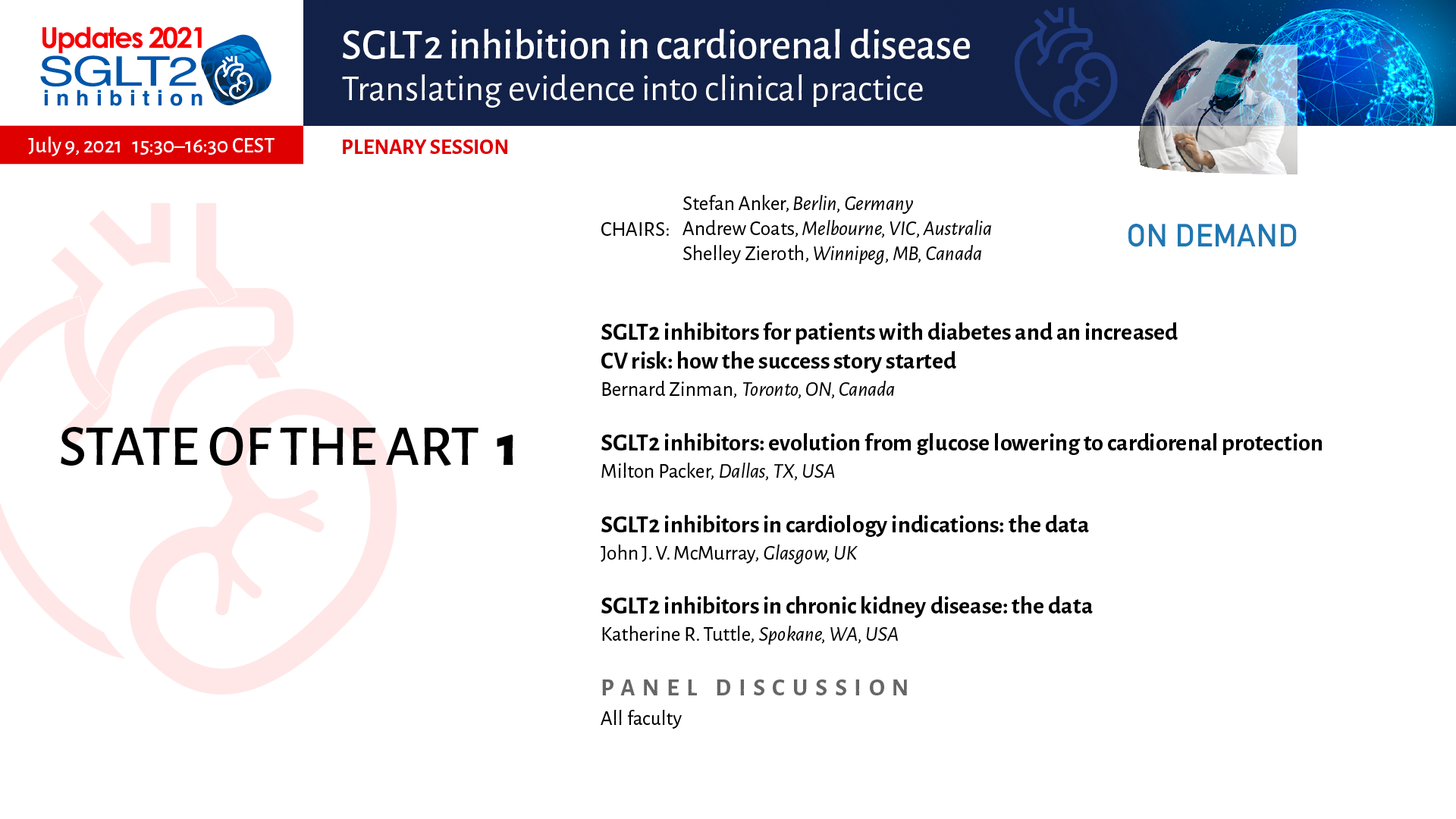 12m 18sPart 1 | Session 4 SGLT2 Inhibitors in Cardiology Indications: The Data John JV McMurray
12m 18sPart 1 | Session 4 SGLT2 Inhibitors in Cardiology Indications: The Data John JV McMurray
-
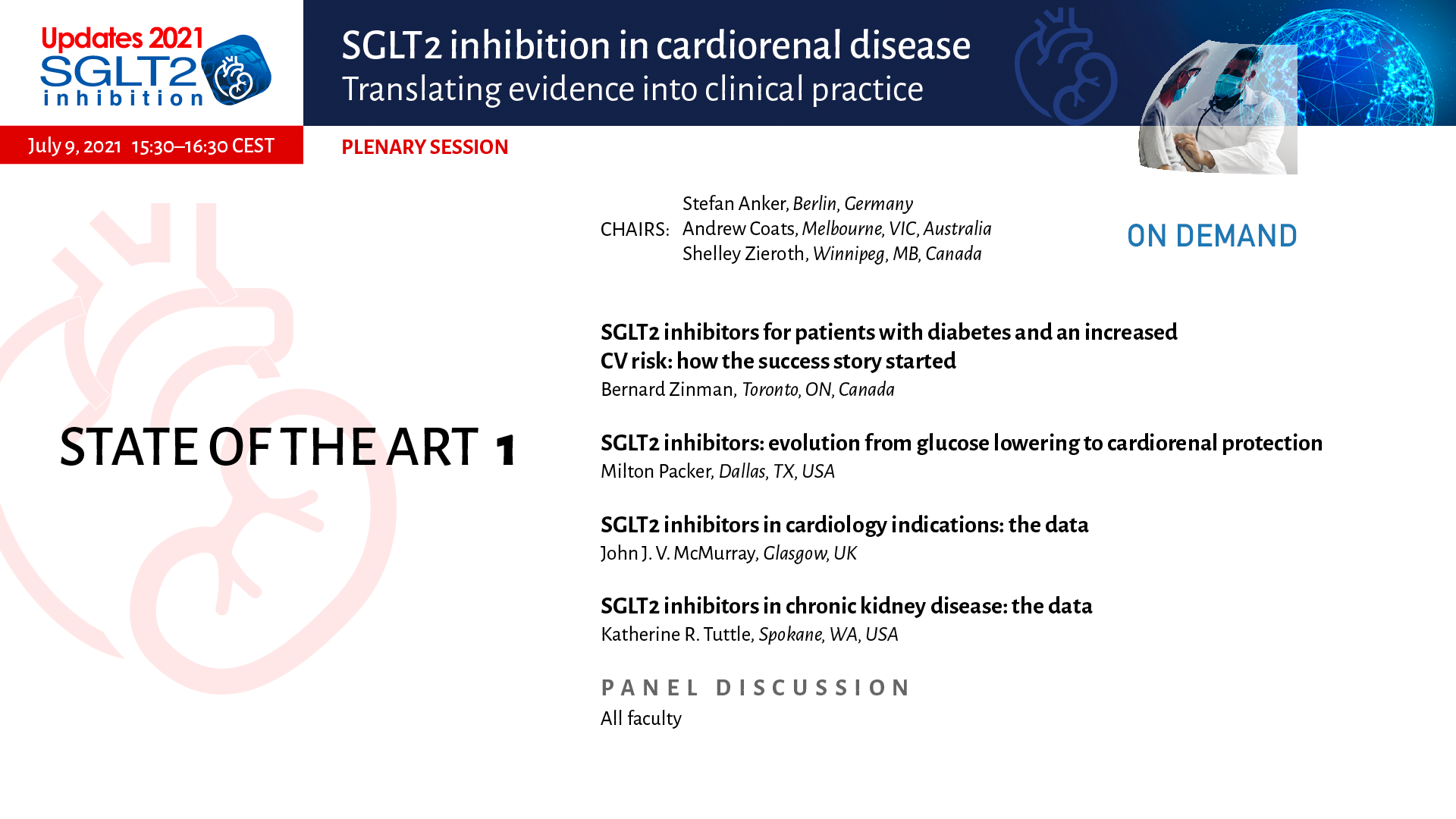 9m 38sPart 1 | Session 5 SGLT2 Inhibitors in Chronic Kidney Disease: The Data Katherine Tuttle
9m 38sPart 1 | Session 5 SGLT2 Inhibitors in Chronic Kidney Disease: The Data Katherine Tuttle
-
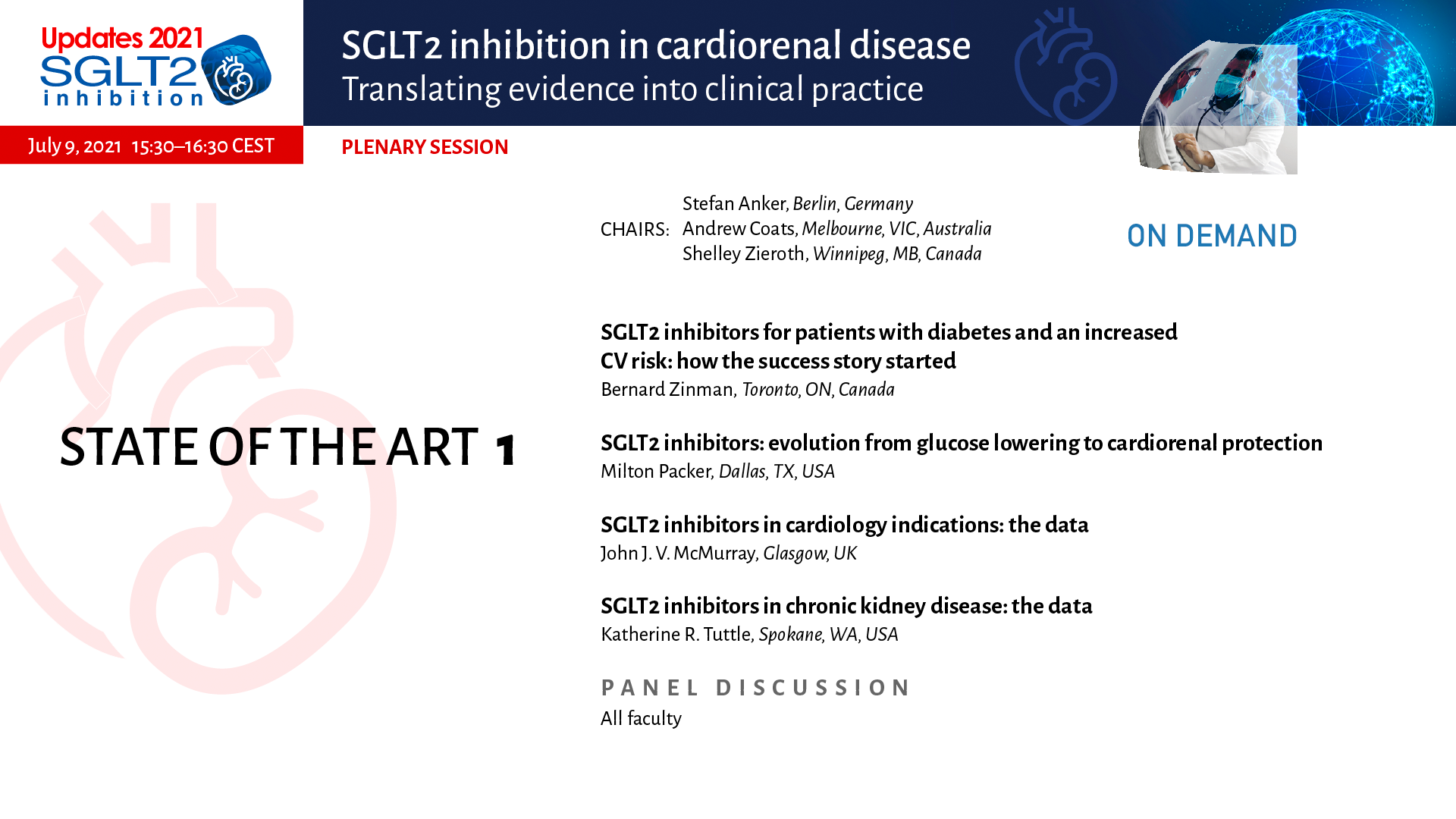 14m 38sPart 1 | Session 6 Panel Discussion Stefan Anker, Shelley Zieroth, Andrew JS Coats, Bernard Zinman, John JV McMurray, Katherine Tuttle
14m 38sPart 1 | Session 6 Panel Discussion Stefan Anker, Shelley Zieroth, Andrew JS Coats, Bernard Zinman, John JV McMurray, Katherine Tuttle
-
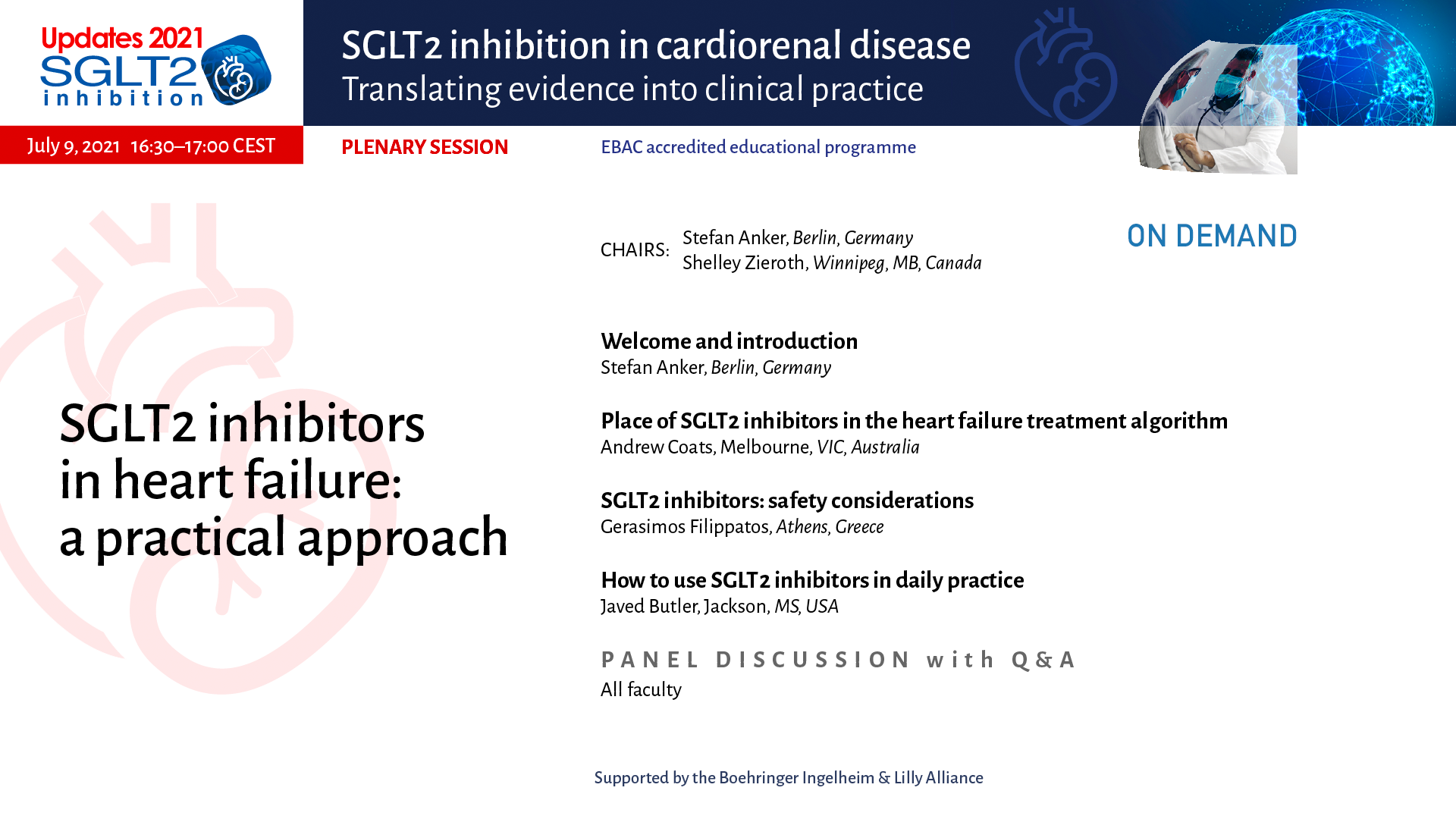 9m 39sPart 2 | Session 1 Place of SGLT2 Inhibitors in the Heart Failure Treatment Algorithm Andrew JS Coats
9m 39sPart 2 | Session 1 Place of SGLT2 Inhibitors in the Heart Failure Treatment Algorithm Andrew JS Coats
-
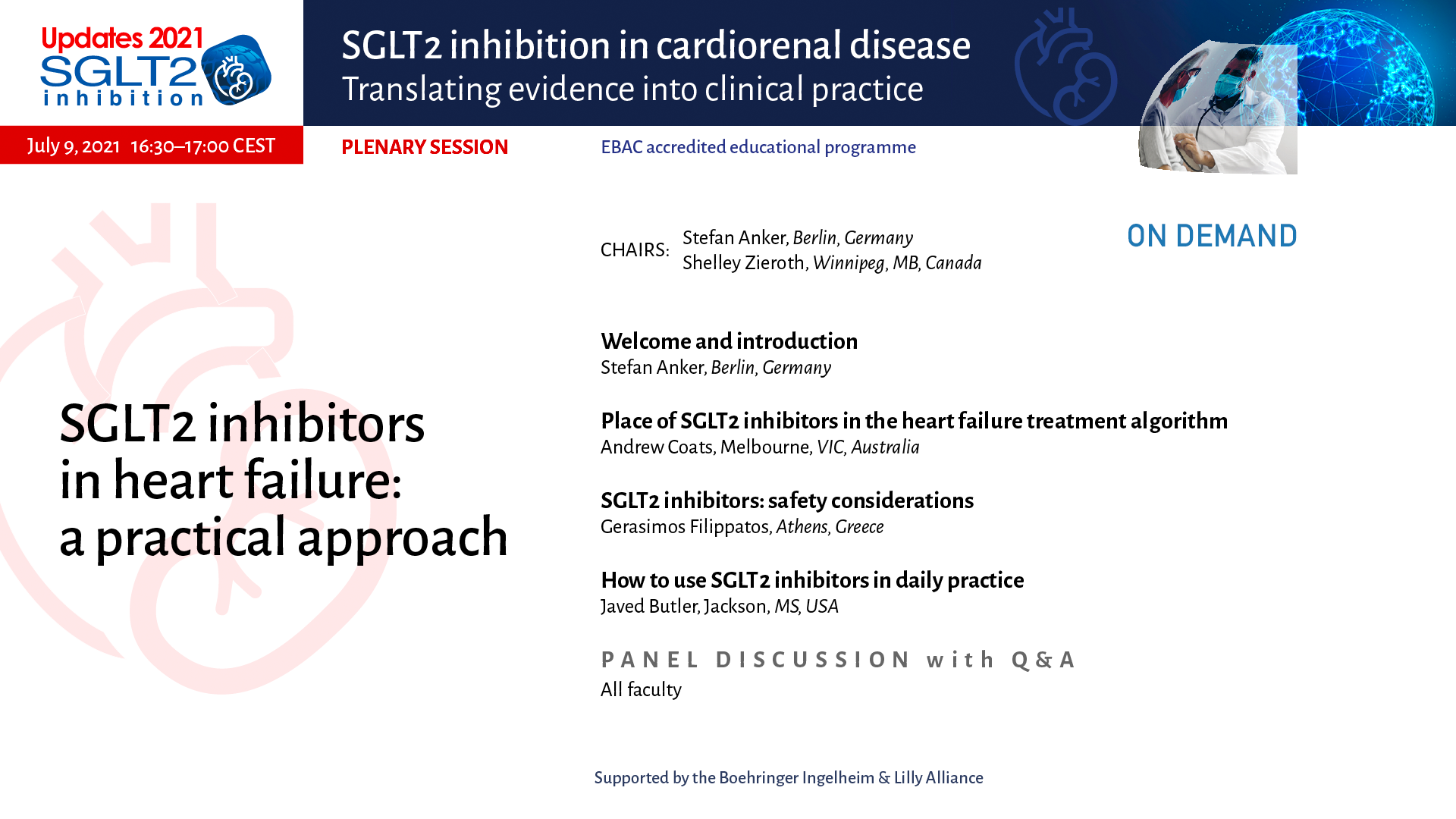 8m 1sPart 2 | Session 2 SGLT2 Inhibitors: Safety Considerations Gerasimos Filippatos
8m 1sPart 2 | Session 2 SGLT2 Inhibitors: Safety Considerations Gerasimos Filippatos
-
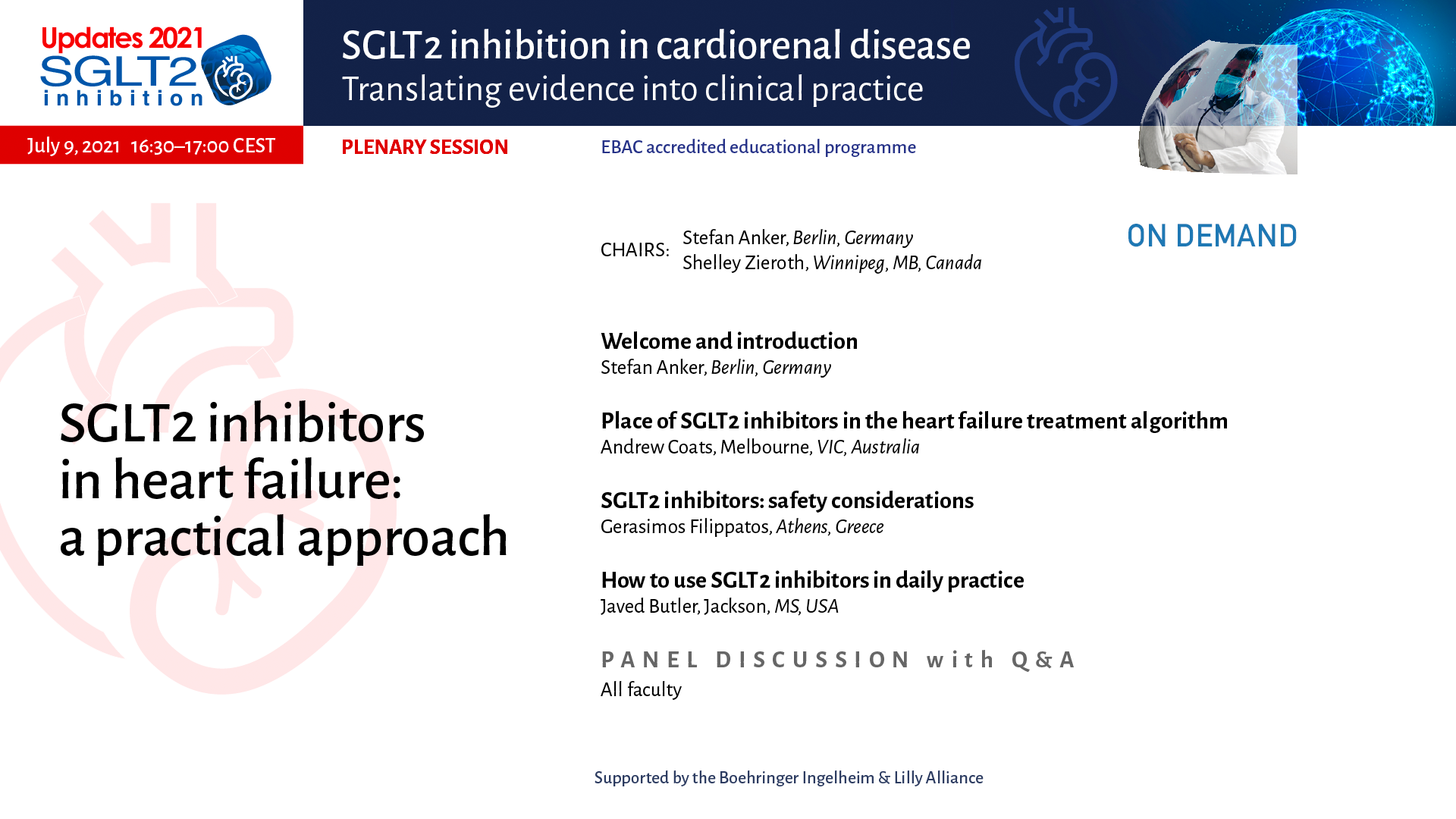 7m 39sPart 2 | Session 3 How to Use SGLT2 Inhibitors in Daily Practice Javed Butler
7m 39sPart 2 | Session 3 How to Use SGLT2 Inhibitors in Daily Practice Javed Butler
-
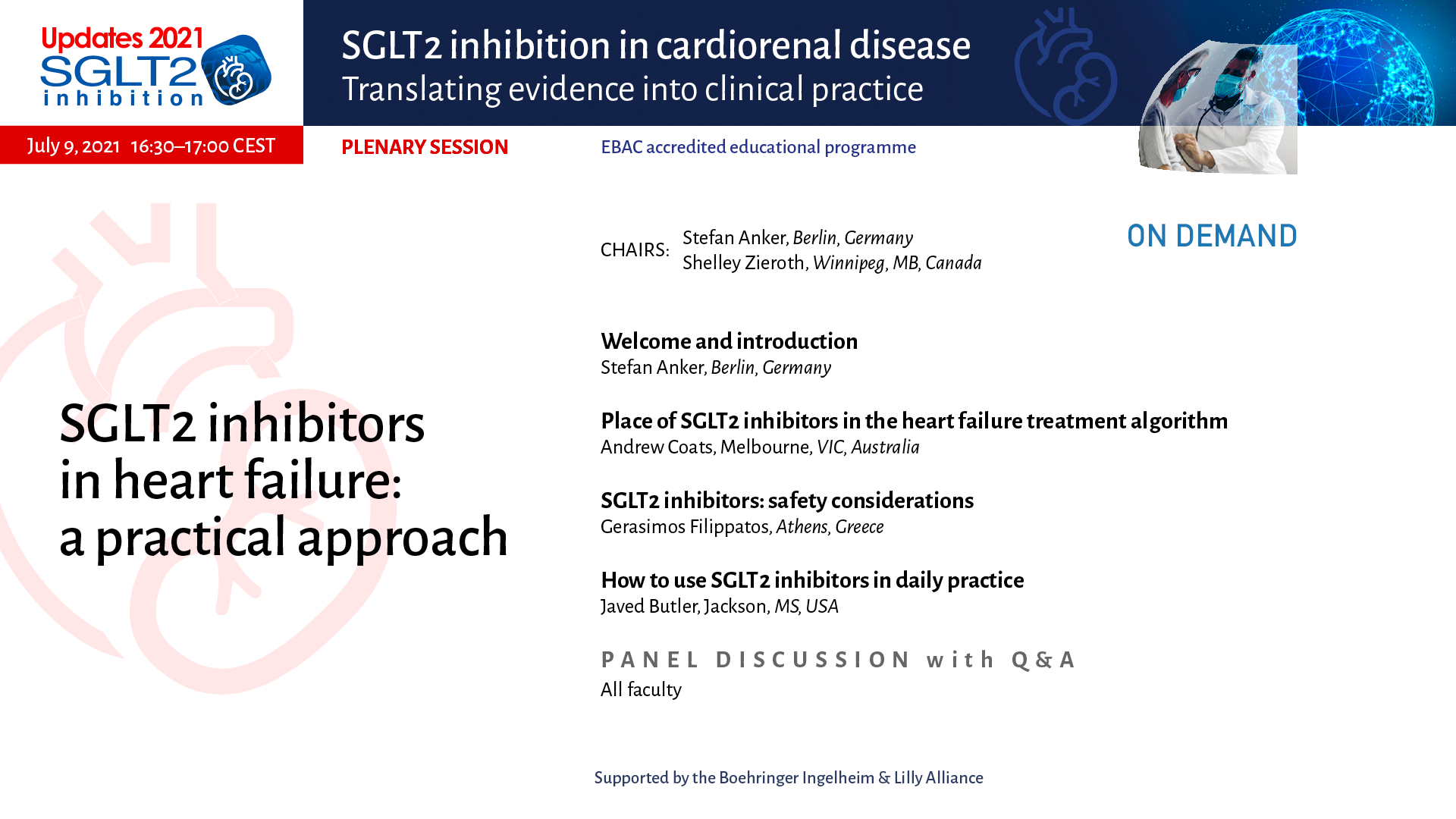 6m 58sPart 2 | Session 4 Panel Discussion Andrew JS Coats, Gerasimos Filippatos, Shelley Zieroth, Stefan Anker
6m 58sPart 2 | Session 4 Panel Discussion Andrew JS Coats, Gerasimos Filippatos, Shelley Zieroth, Stefan Anker
-
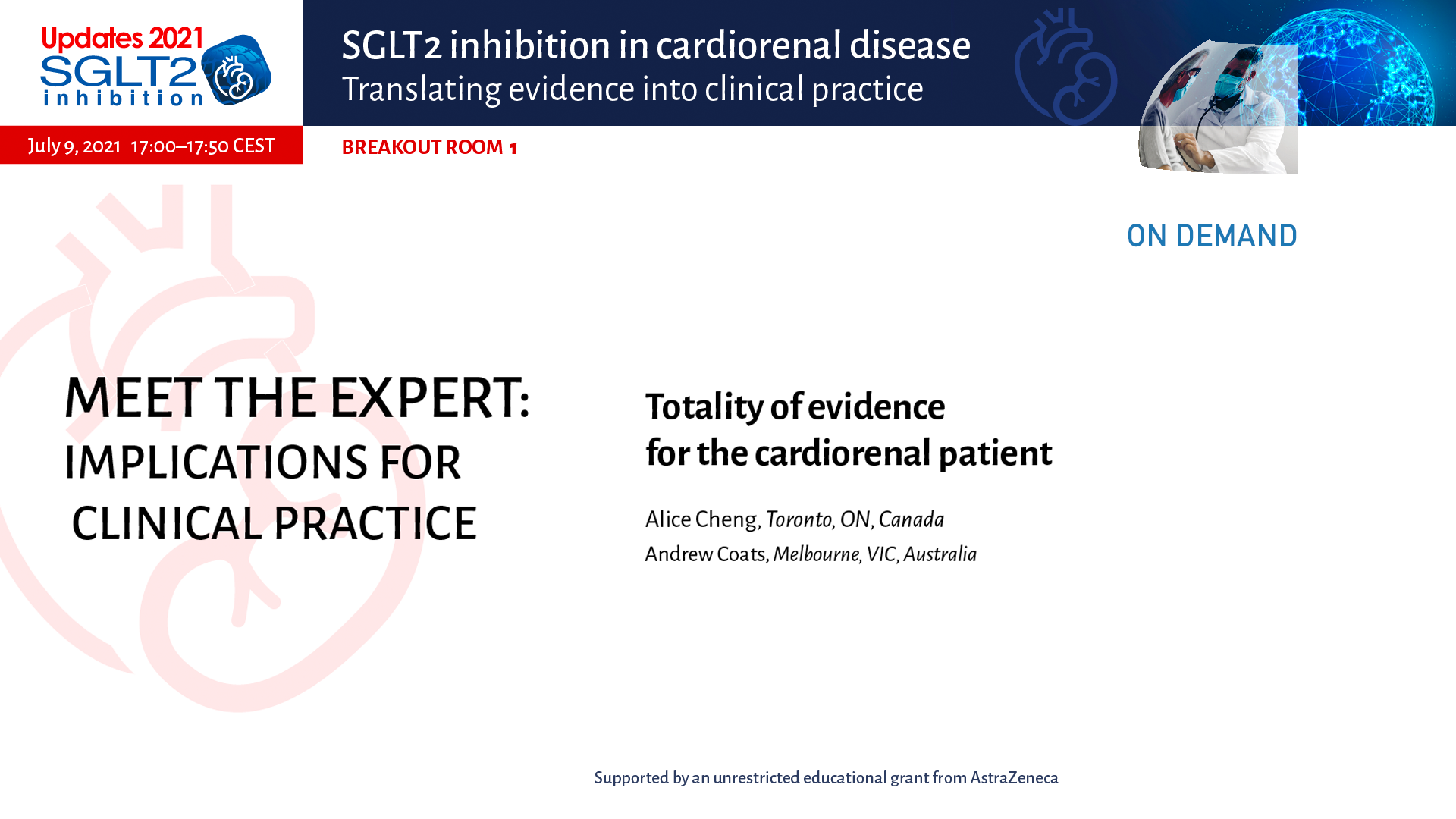 3m 56sPart 3 | Session 1 Totality of Evidence for the Cardiorenal Patient Alice Cheng, Andrew JS Coats
3m 56sPart 3 | Session 1 Totality of Evidence for the Cardiorenal Patient Alice Cheng, Andrew JS Coats
-
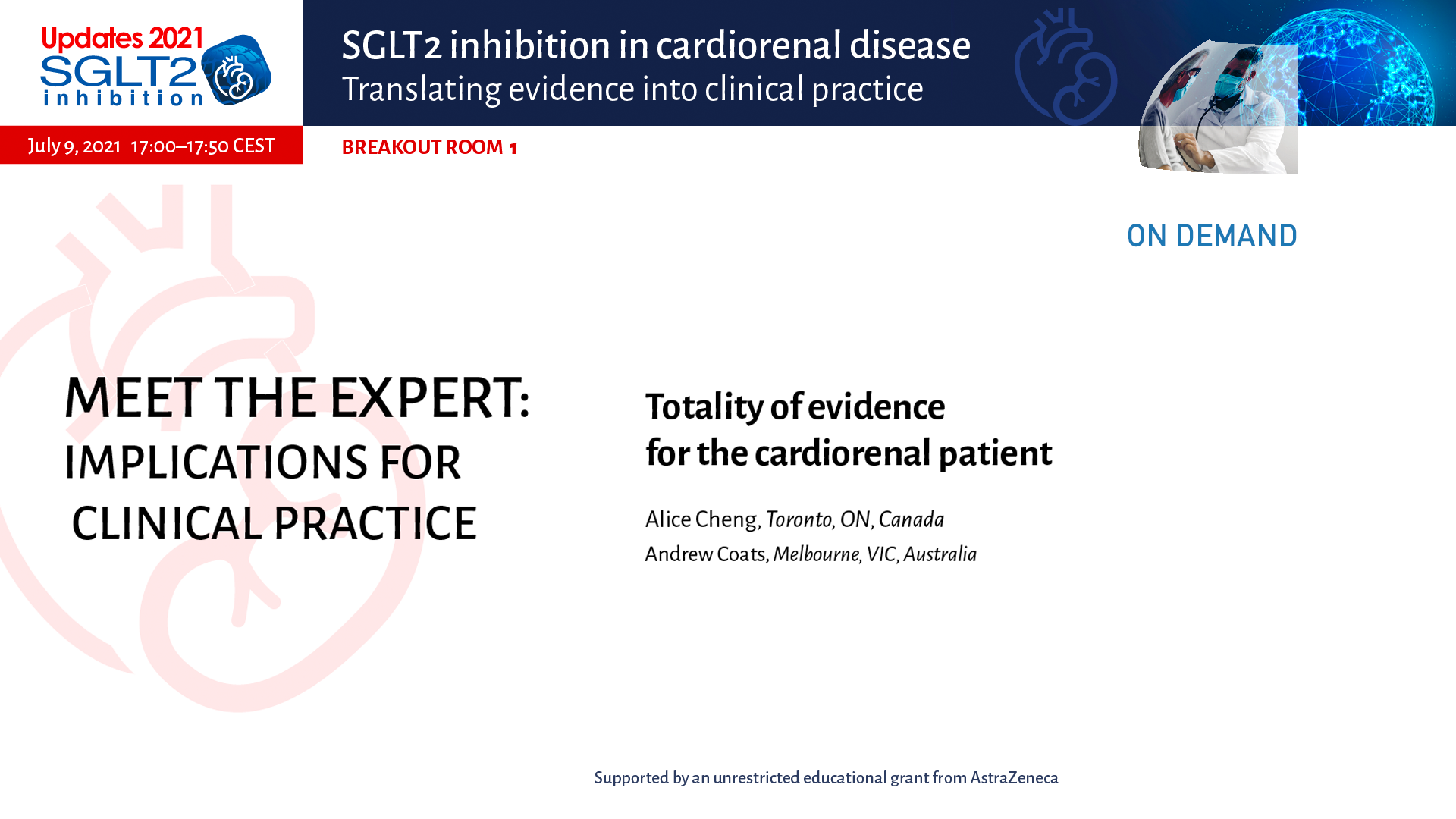 50m 42sPart 3 | Session 2 Discussion Alice Cheng, Andrew JS Coats
50m 42sPart 3 | Session 2 Discussion Alice Cheng, Andrew JS Coats
-
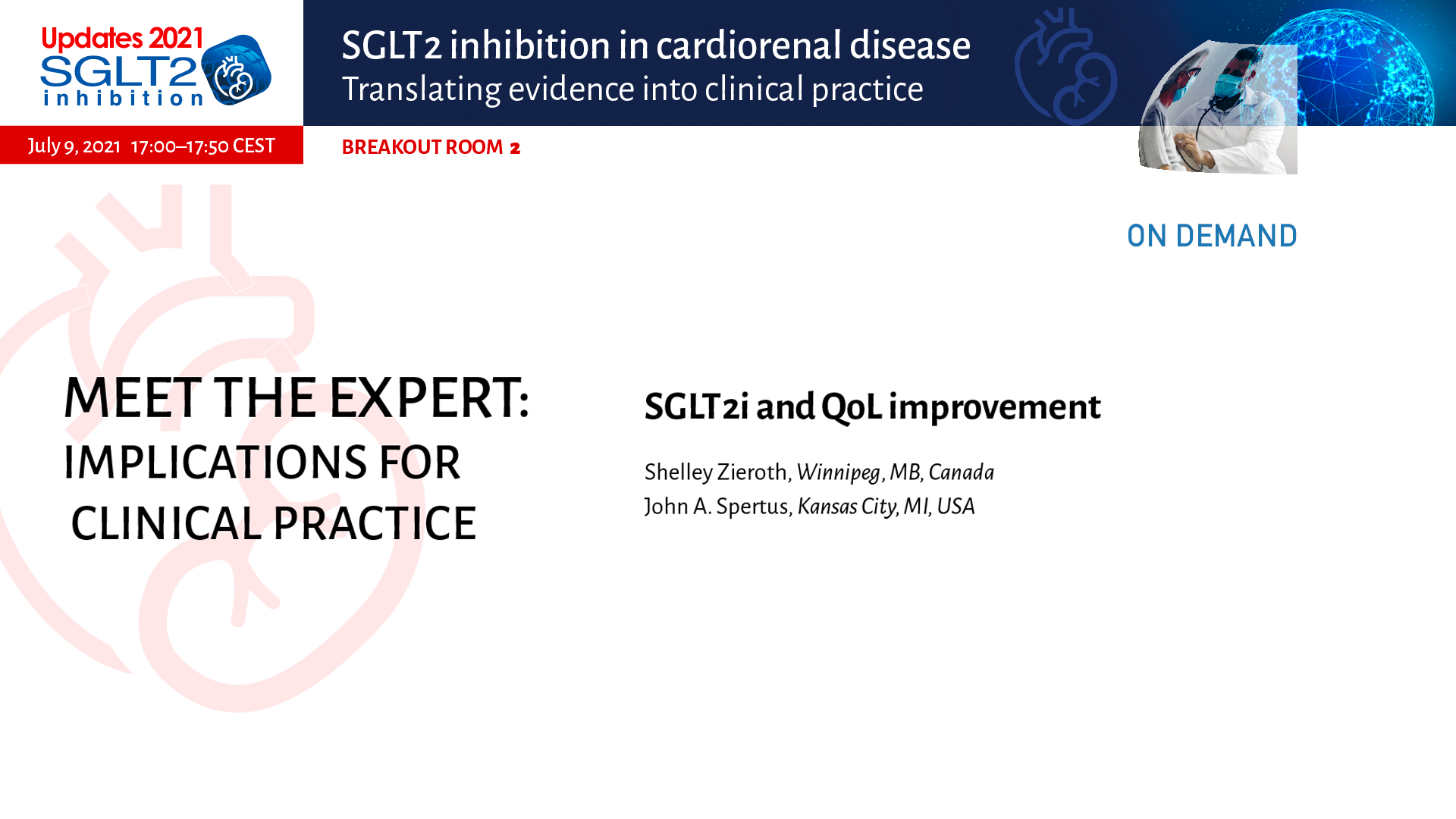 1m 55sPart 4 | Session 1 Welcome and Introduction Shelley Zieroth, John Spertus
1m 55sPart 4 | Session 1 Welcome and Introduction Shelley Zieroth, John Spertus
-
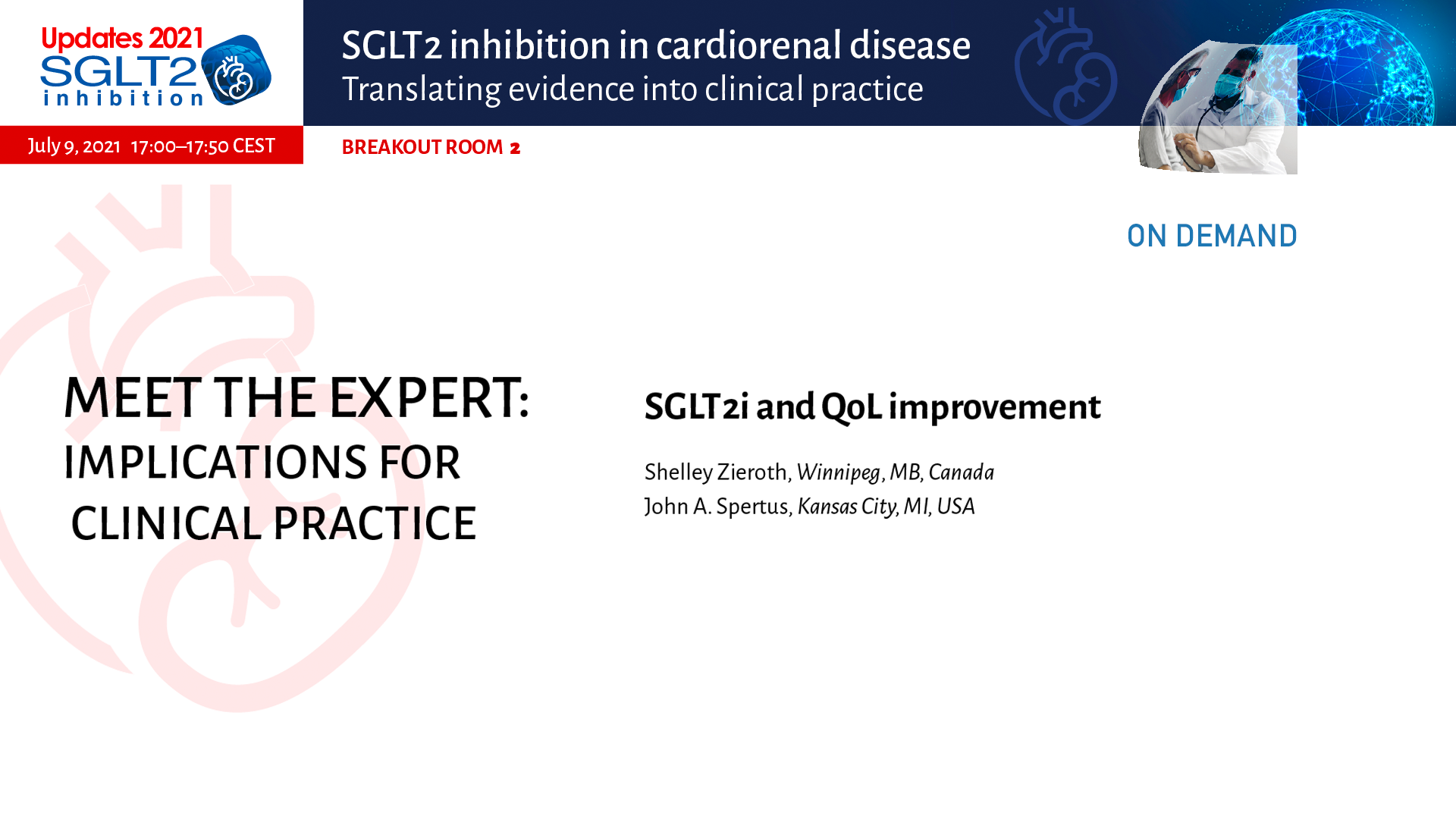 43mPart 4 | Session 2 KCCQ Score Overview and Discussion Shelley Zieroth, John Spertus
43mPart 4 | Session 2 KCCQ Score Overview and Discussion Shelley Zieroth, John Spertus
-
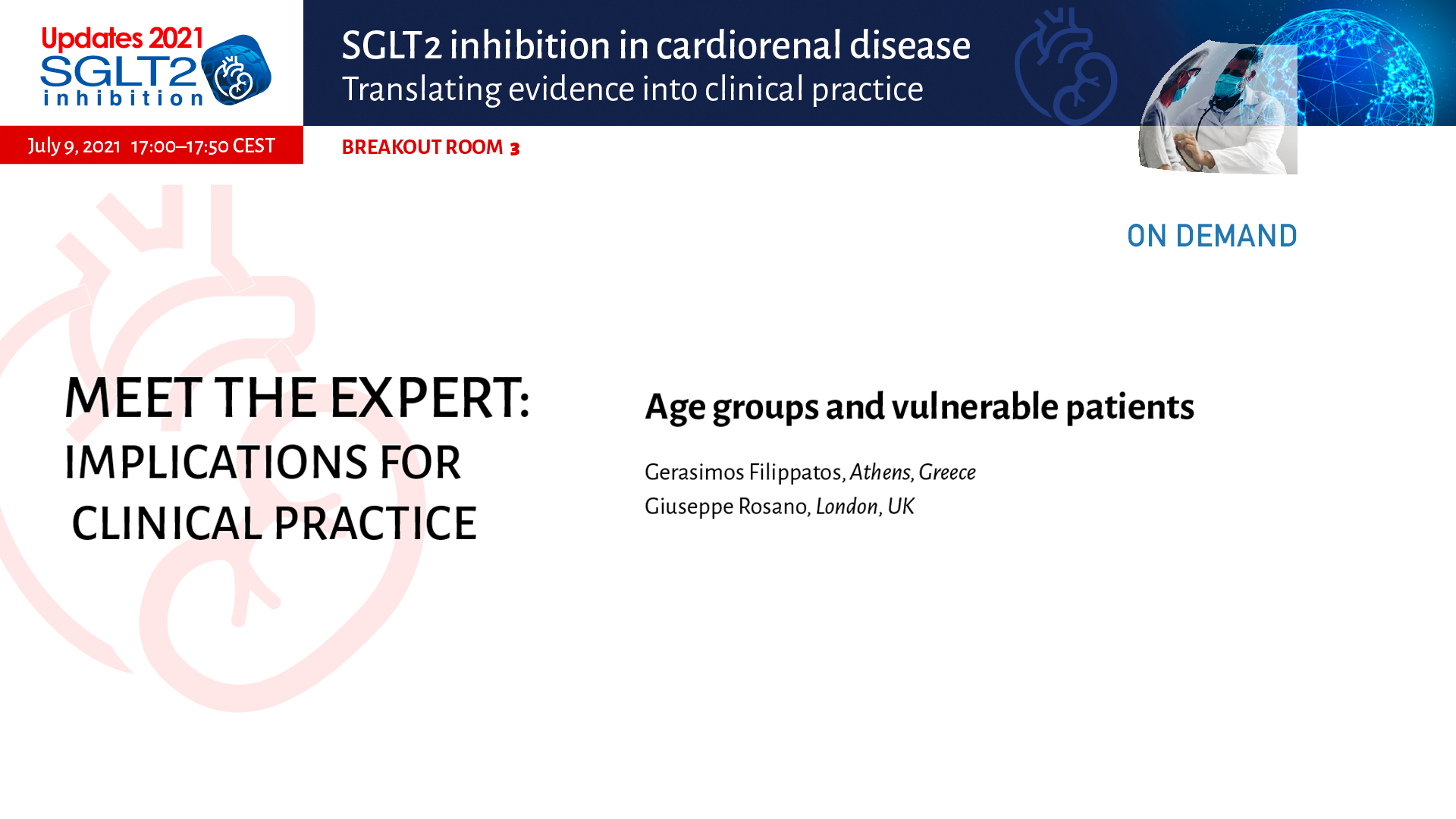 1m 11sPart 5 | Session 1 Welcome and Introduction Gerasimos Filippatos, Giuseppe Rosano
1m 11sPart 5 | Session 1 Welcome and Introduction Gerasimos Filippatos, Giuseppe Rosano
-
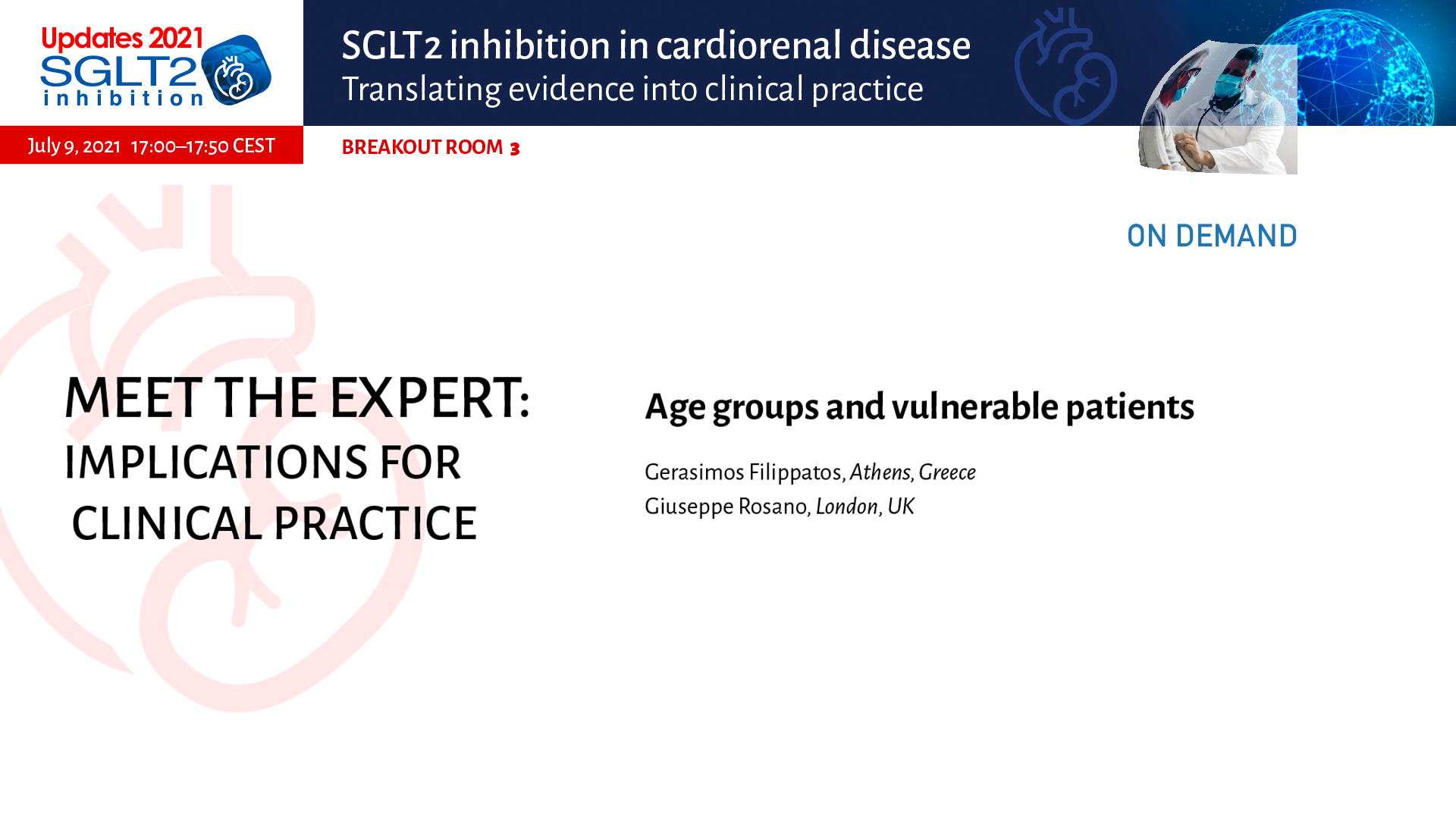 7m 5sPart 5 | Session 2 SGLT2i in the Elderly and Vulnerable Patients Gerasimos Filippatos
7m 5sPart 5 | Session 2 SGLT2i in the Elderly and Vulnerable Patients Gerasimos Filippatos
-
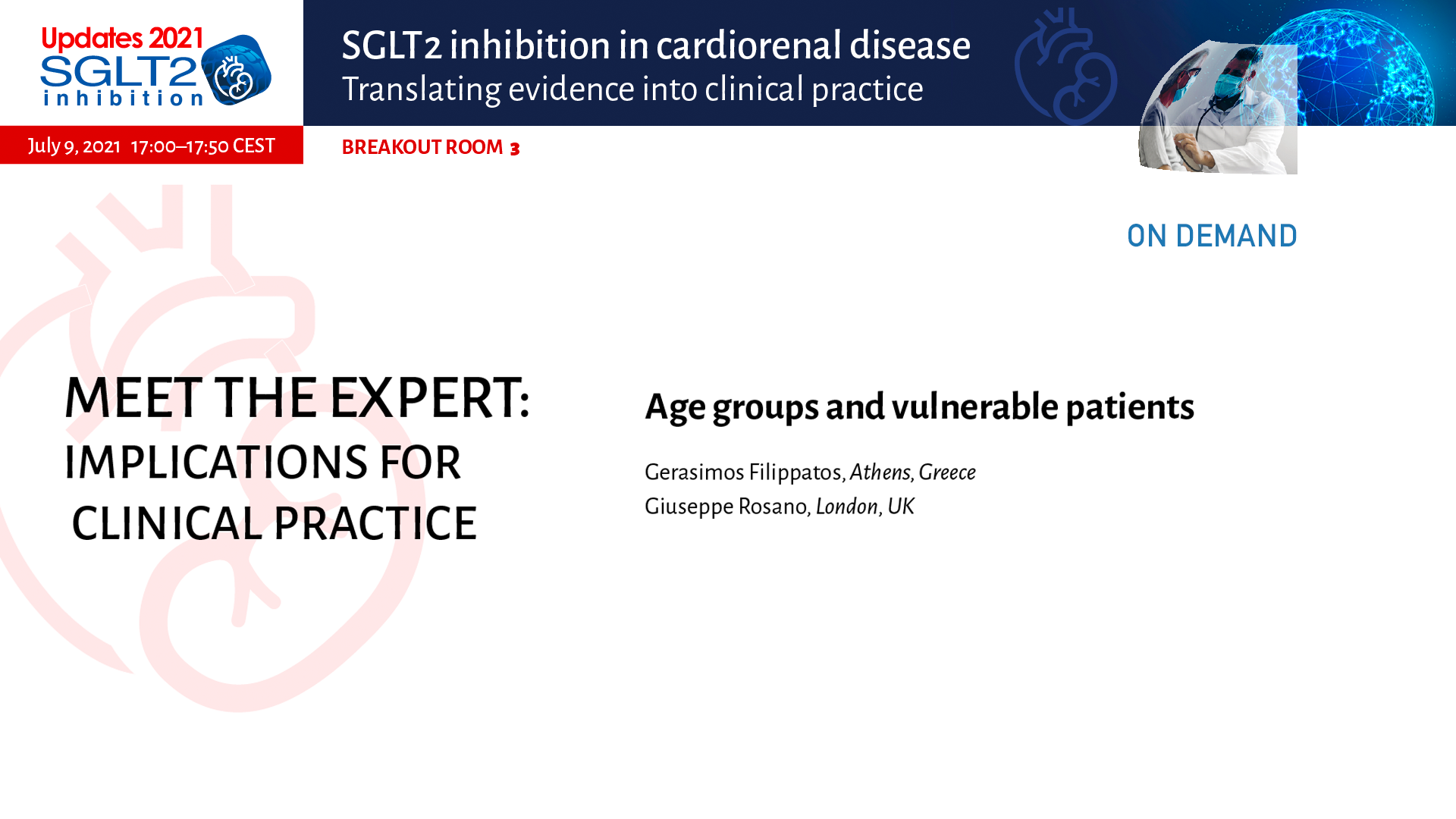 27m 15sPart 5 | Session 3 Discussion Giuseppe Rosano, Gerasimos Filippatos
27m 15sPart 5 | Session 3 Discussion Giuseppe Rosano, Gerasimos Filippatos
-
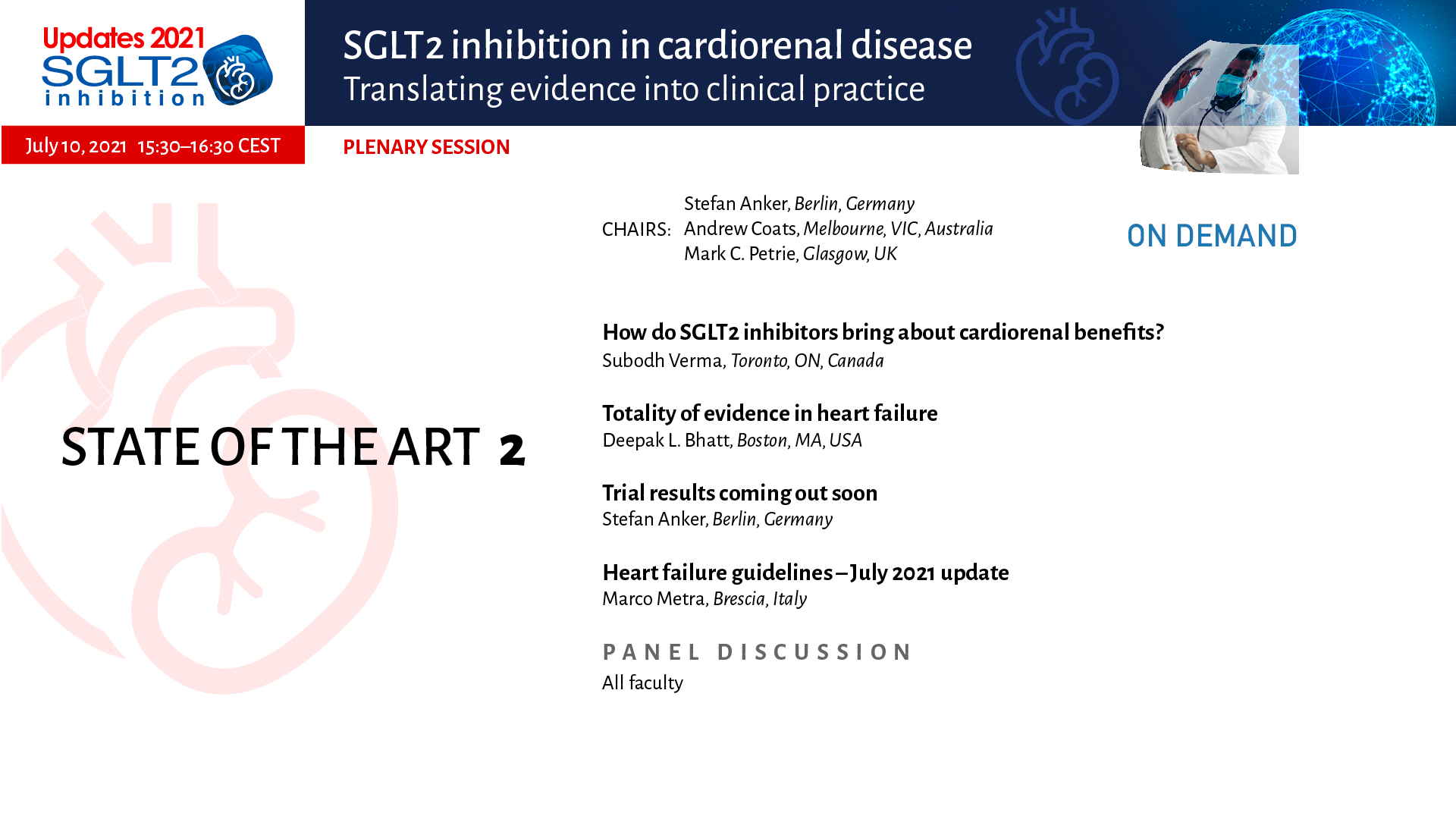 1m 20sPart 6 | Session 1 Welcome and Introduction Stefan Anker, Mark Petrie
1m 20sPart 6 | Session 1 Welcome and Introduction Stefan Anker, Mark Petrie
-
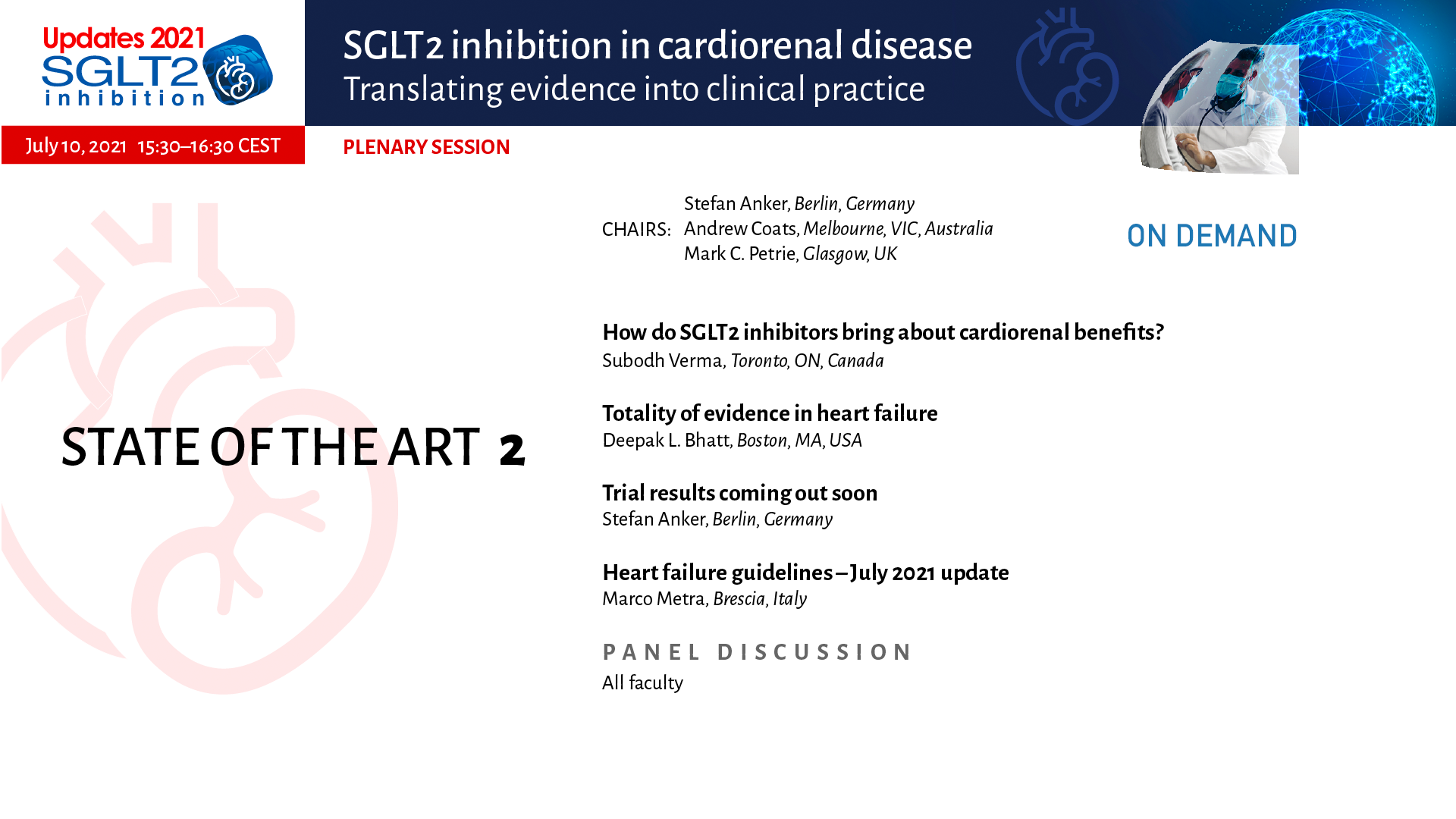 11m 2sPart 6 | Session 2 How do SGLT2 Inhibitors Bring About Cardiorenal Benefits? Subodh Verma
11m 2sPart 6 | Session 2 How do SGLT2 Inhibitors Bring About Cardiorenal Benefits? Subodh Verma
-
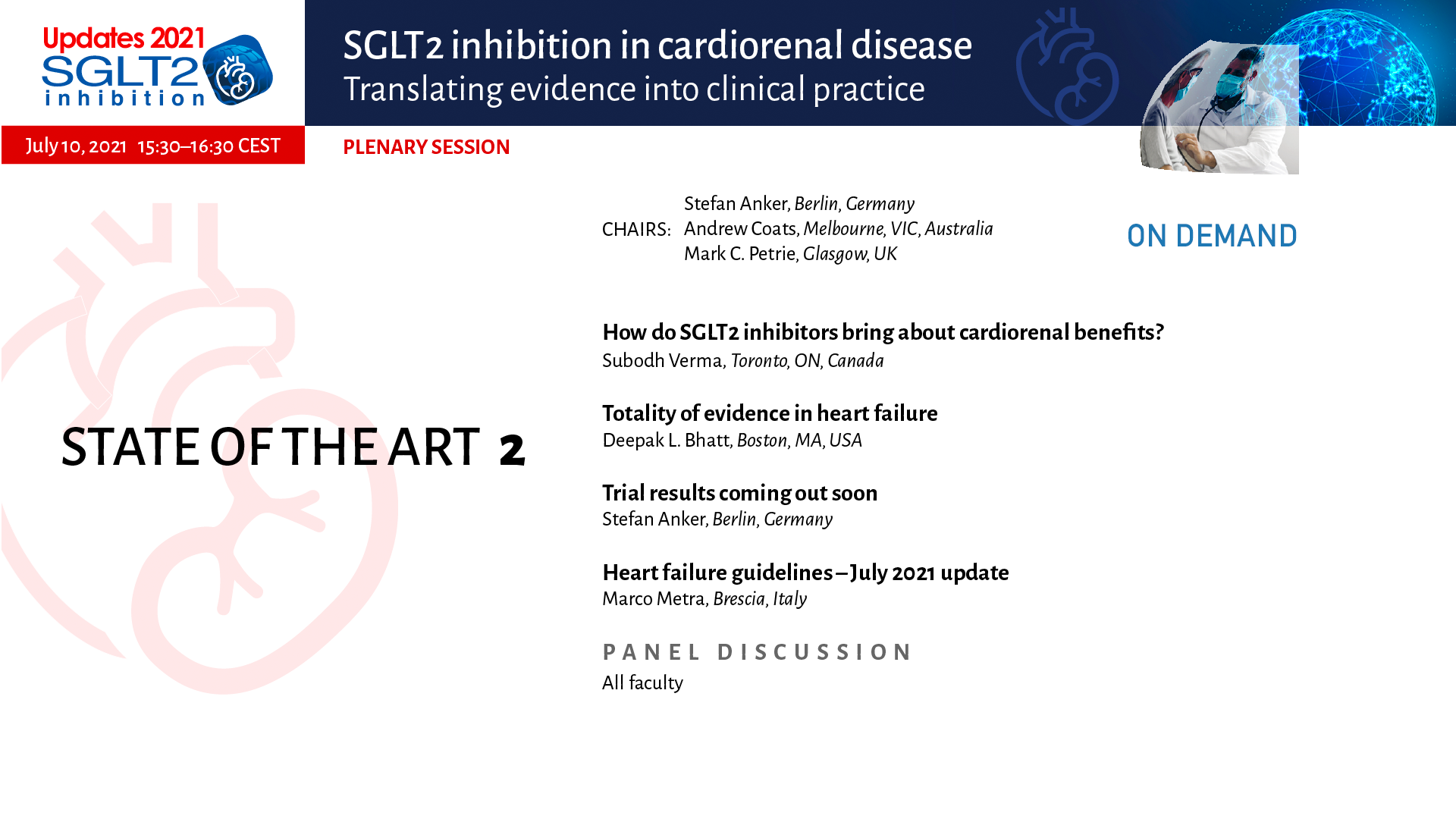 11m 24sPart 6 | Session 3 Totality of Evidence in Heart Failure Deepak L Bhatt
11m 24sPart 6 | Session 3 Totality of Evidence in Heart Failure Deepak L Bhatt
-
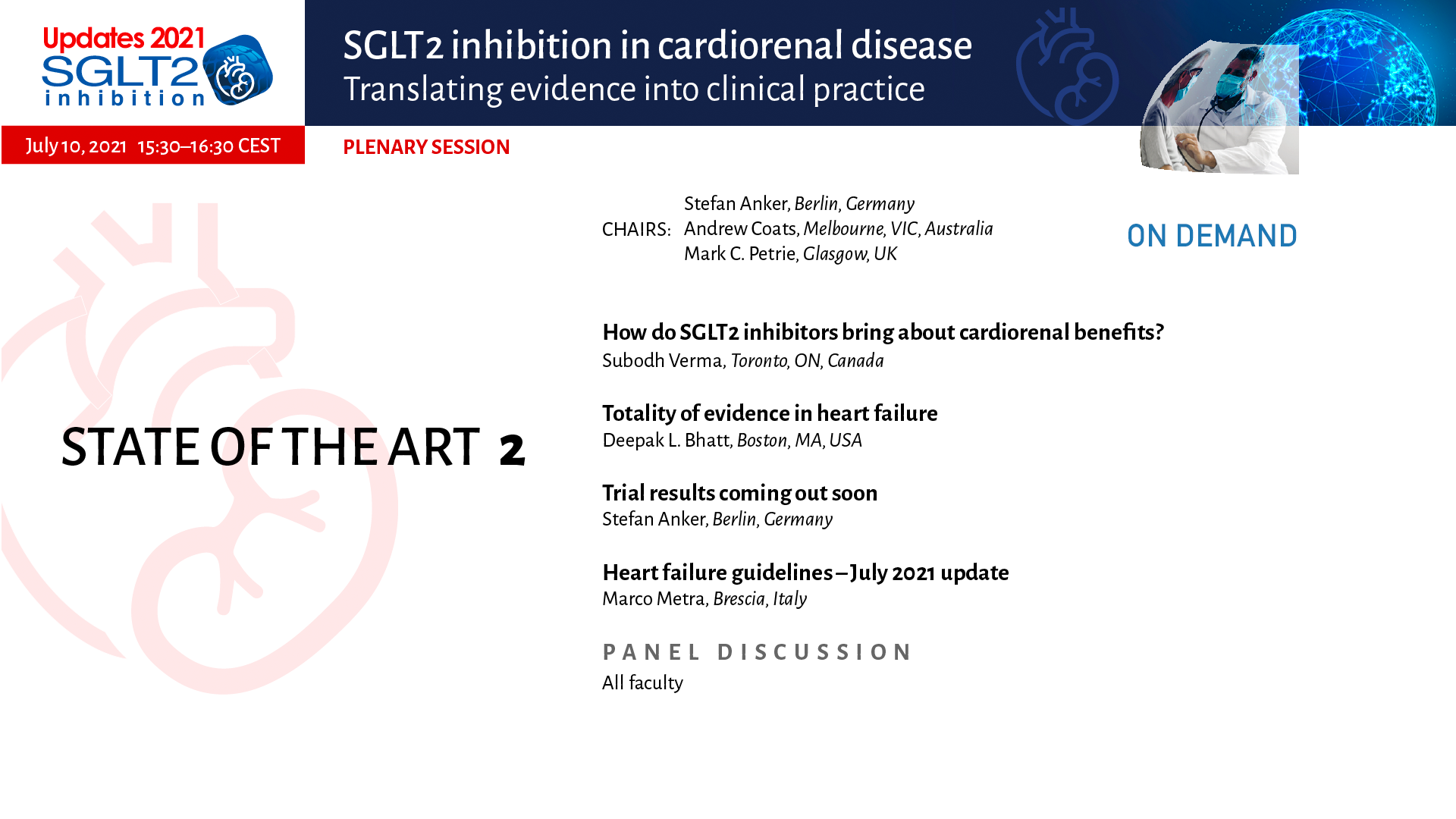 11m 20sPart 6 | Session 4 Trial Results Coming Out Soon Stefan Anker
11m 20sPart 6 | Session 4 Trial Results Coming Out Soon Stefan Anker
-
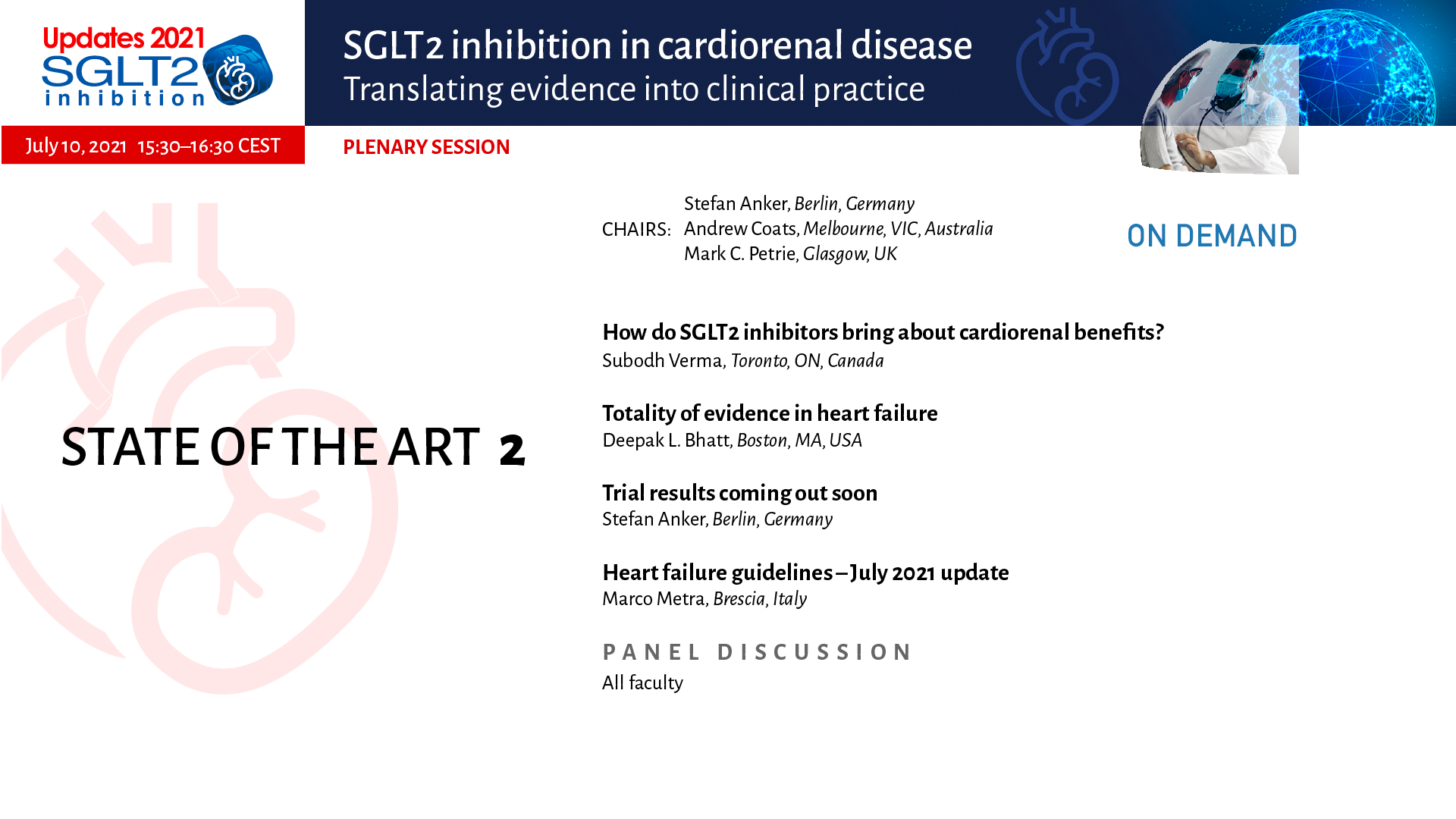 10m 55sPart 6 | Session 5 Heart Failure Guidelines Marco Metra
10m 55sPart 6 | Session 5 Heart Failure Guidelines Marco Metra
-
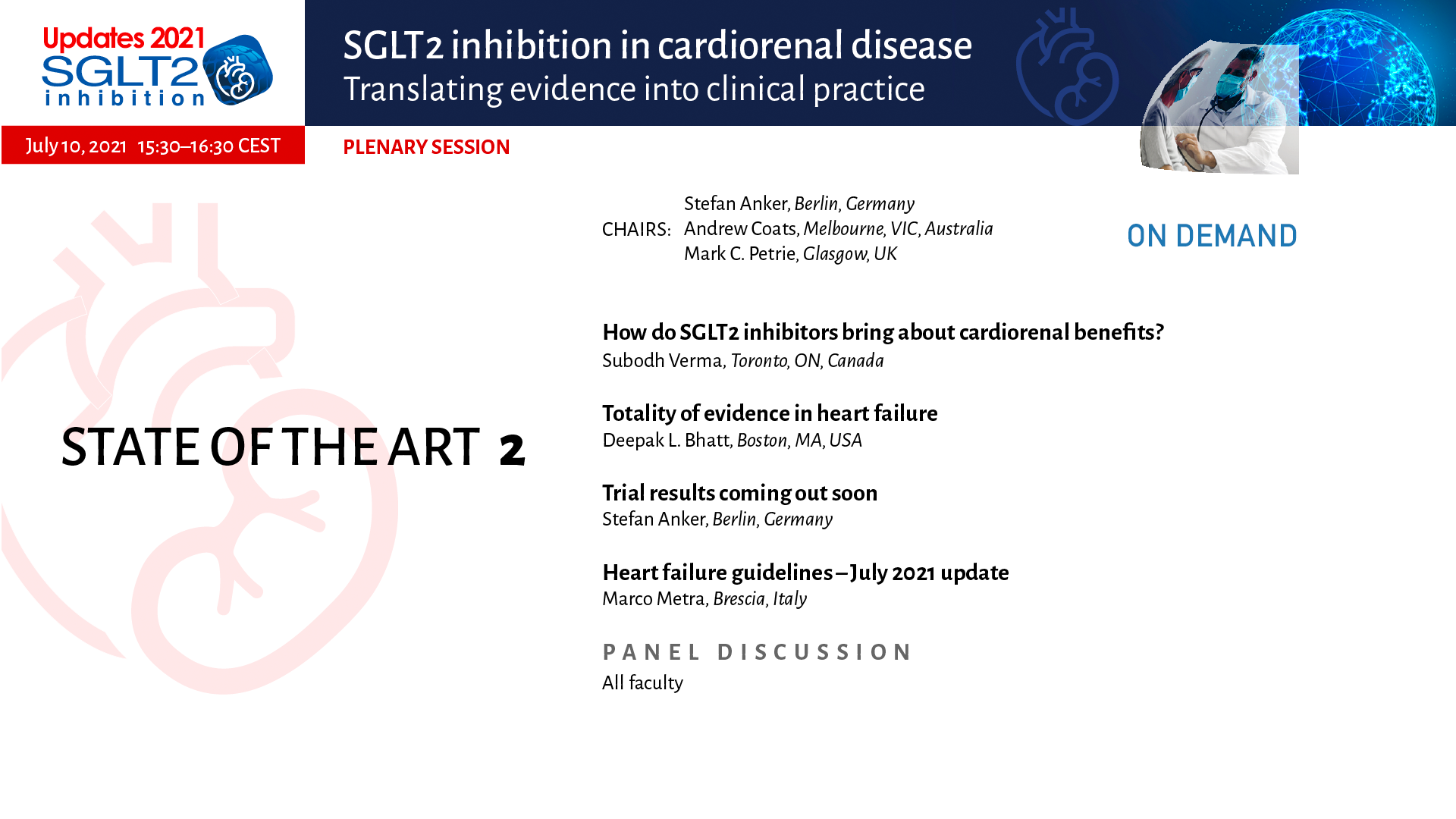 14m 37sPart 6 | Session 6 Panel Discussion Stefan Anker, Mark Petrie, Deepak L Bhatt, Marco Metra
14m 37sPart 6 | Session 6 Panel Discussion Stefan Anker, Mark Petrie, Deepak L Bhatt, Marco Metra
-
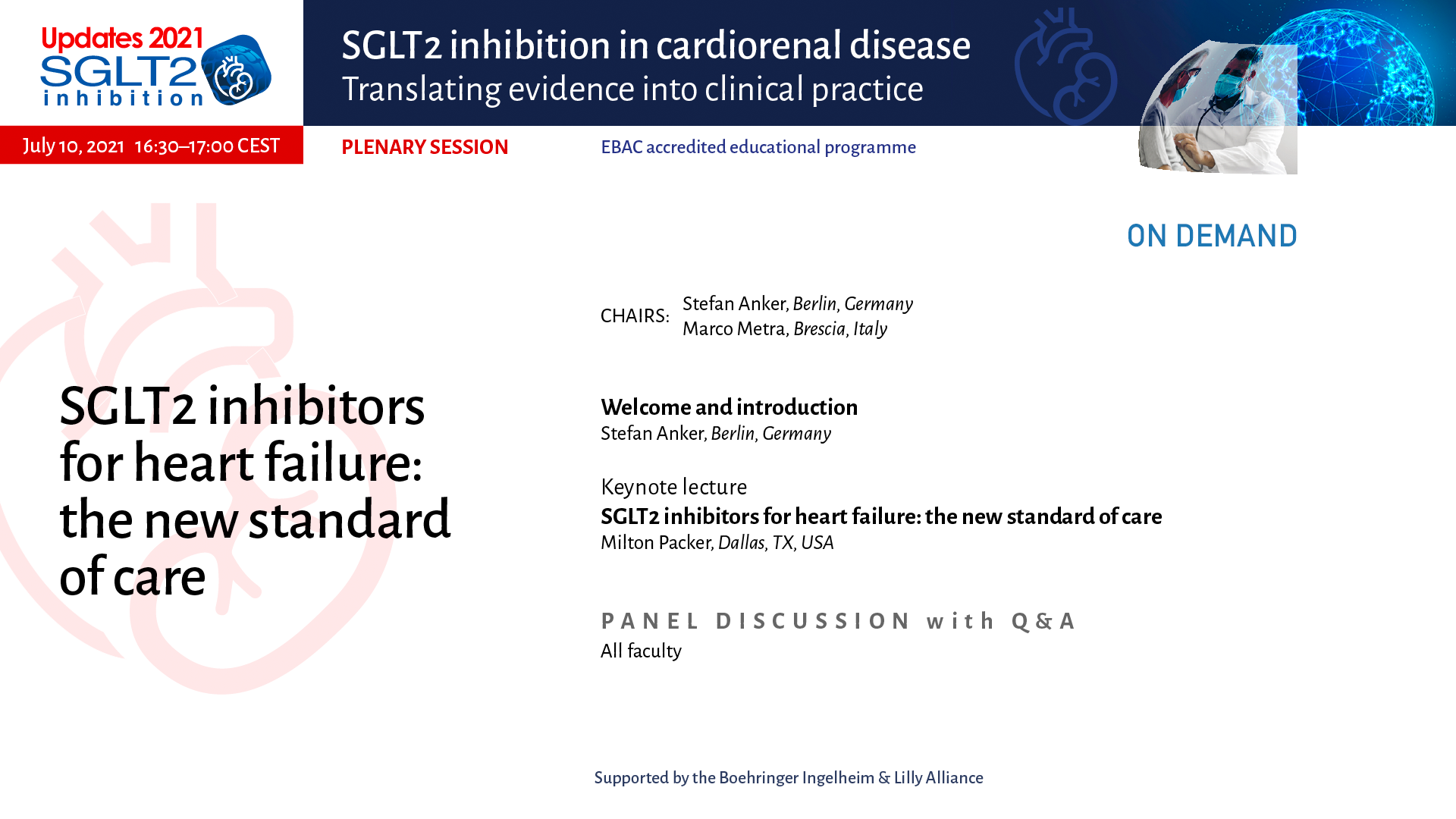 1m 1sPart 7 | Session 1 Welcome and Introduction Stefan Anker, Mark Petrie, Marco Metra
1m 1sPart 7 | Session 1 Welcome and Introduction Stefan Anker, Mark Petrie, Marco Metra
Overview
Organised with scientific co-chairs Stefan Anker and Andrew Coats, this event includes presentations and panel discussions with a host of international thought-leaders.
The SGLT2 Updates 2021 conference SGLT2 Inhibition in Cardiorenal Disease: Translating Evidence into Clinical Practice covers the place of SGLT2 inhibitors in the newly released guidelines of the Heart Failure Association (HFA) of the European Society of Cardiology (ESC) as well as their implementation in clinical practice.
In addition to plenary sessions and satellite symposia the conference featured a number of Meet The Expert breakout sessions discussing the implications in treatment of specific patient subgroups including patients with comorbidities. Audience questions were submitted throughout and were addressed by the panel experts.
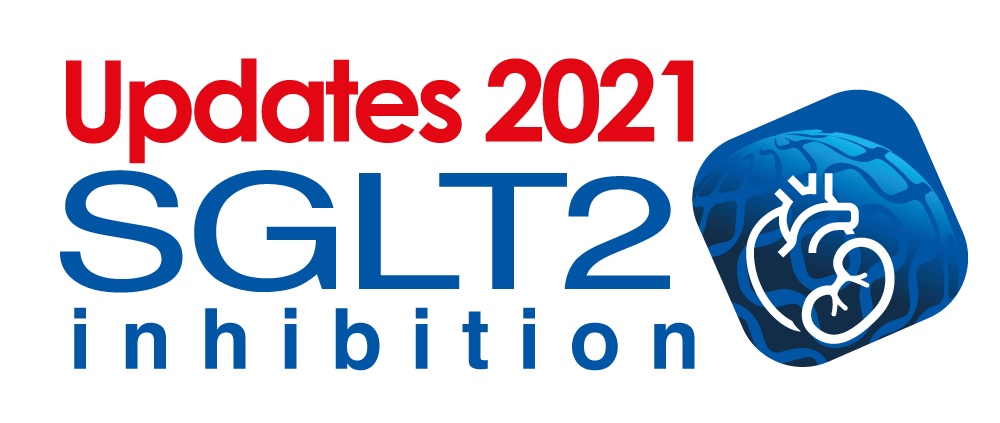
Educational Objectives
SGLT2 Inhibition in Cardiorenal Disease
- Prepare cardiologists, nephrologists and endocrinologists to effectively manage patients with heart failure, individually and collaboratively
- Apply findings from clinical trials into clinical practice
- Describe the role of SGLT2 inhibitors in different patient subgroups, including patients with comorbidities
- Evaluate the safety and cardiorenal benefits of glucose-lowering agents
- Implement the new guidelines of the HFA of the ESC in clinical practice
Target Audience
- Cardiologists
- Nephrologists
- Endocrinologists
More from this programme
Part 1
State of the Art 1
Part 2
SGLT2 Inhibitors in Heart Failure: A Practical Approach
Part 3
Meet The Expert: Implications for Clinical Practice - Breakout 1
Part 4
Meet The Expert: Implications for Clinical Practice - Breakout 2
Part 5
Meet The Expert: Implications for Clinical Practice - Breakout 3
Part 6
State of the Art 2
Part 7
SGLT2 Inhibitors for Heart Failure: The New Standard of Care
Part 8
Meet The Expert: Implications for Clinical Practice - Breakout 4
Part 9
Meet The Expert: Implications for Clinical Practice - Breakout 5
Part 10
Meet The Expert: Implications for Clinical Practice - Breakout 6
Faculty Biographies
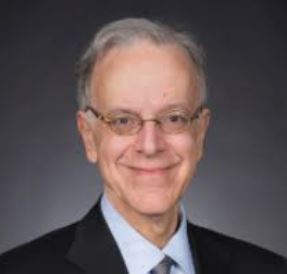
Milton Packer
Distinguished Scholar in Cardiovascular Science
Personal History
Dr Milton Packer was born to Polish immigrants in 1951 and raised in Philadelphia, US. Prior to studying medicine, he was politically active in the 1960s. In his words: “The focus of my upbringing was education, but the major guiding principle in my childhood years (and throughout my entire life) was an uncompromising sense of justice. I was always imbued with the need to strive for and defend the truth.” He began his career in cardiology during a pivotal time for the field, just as interventional cardiology and






